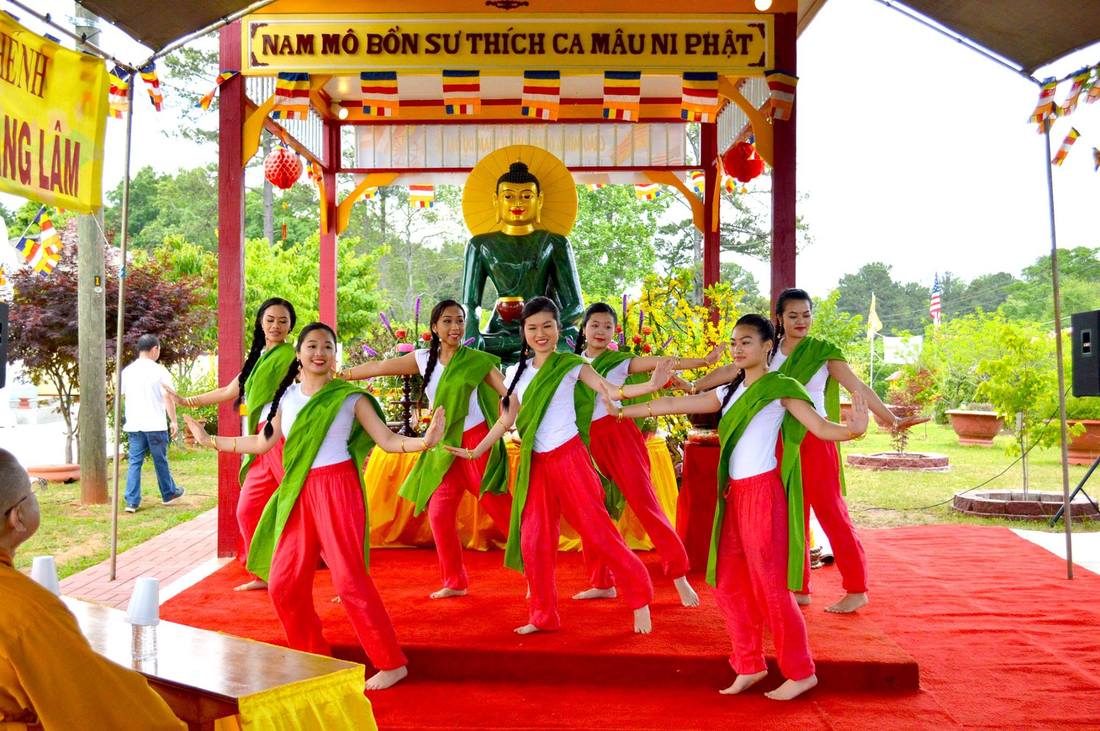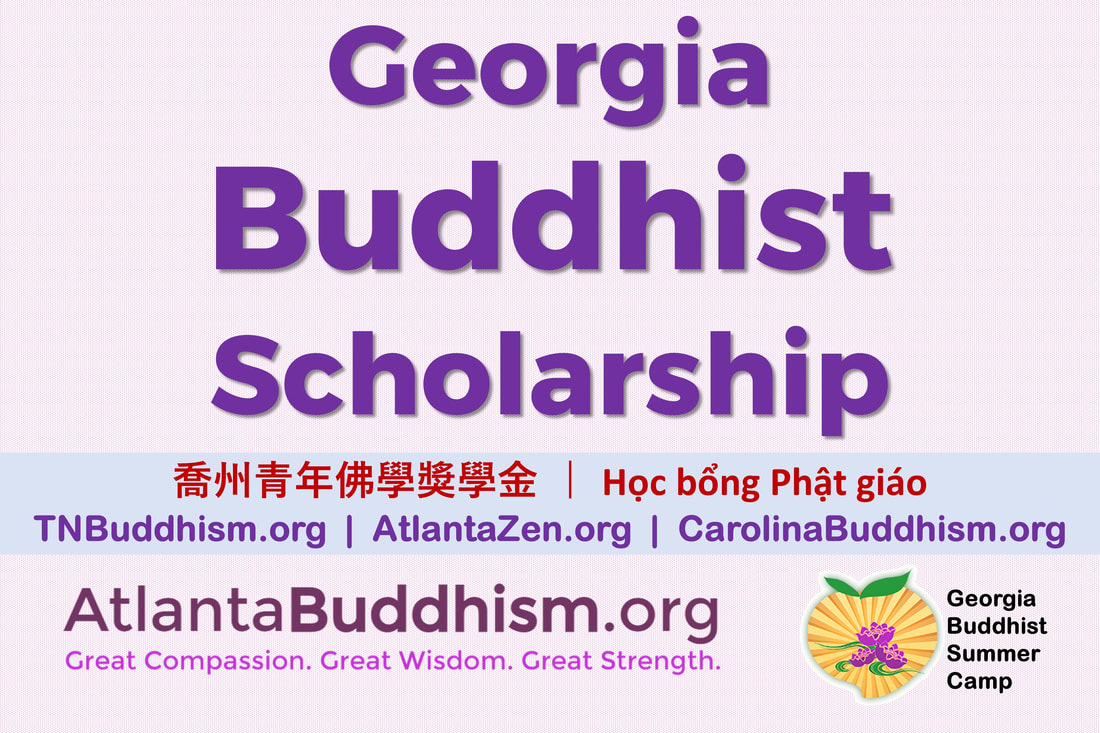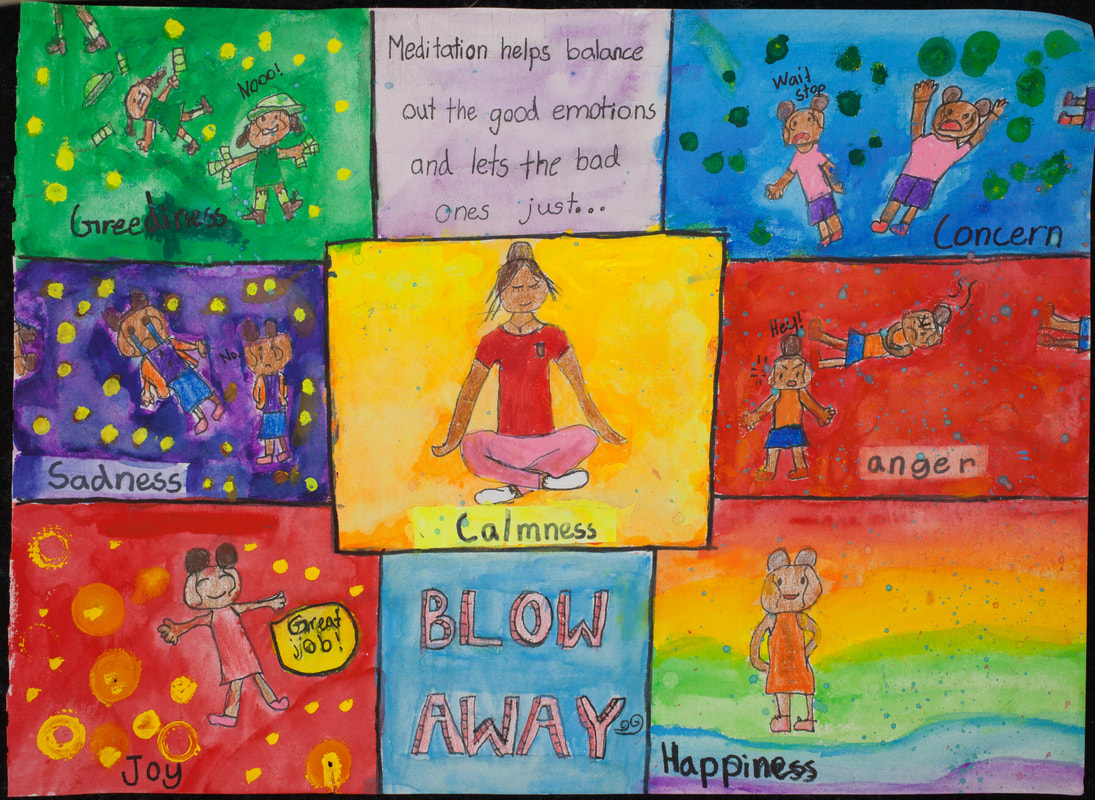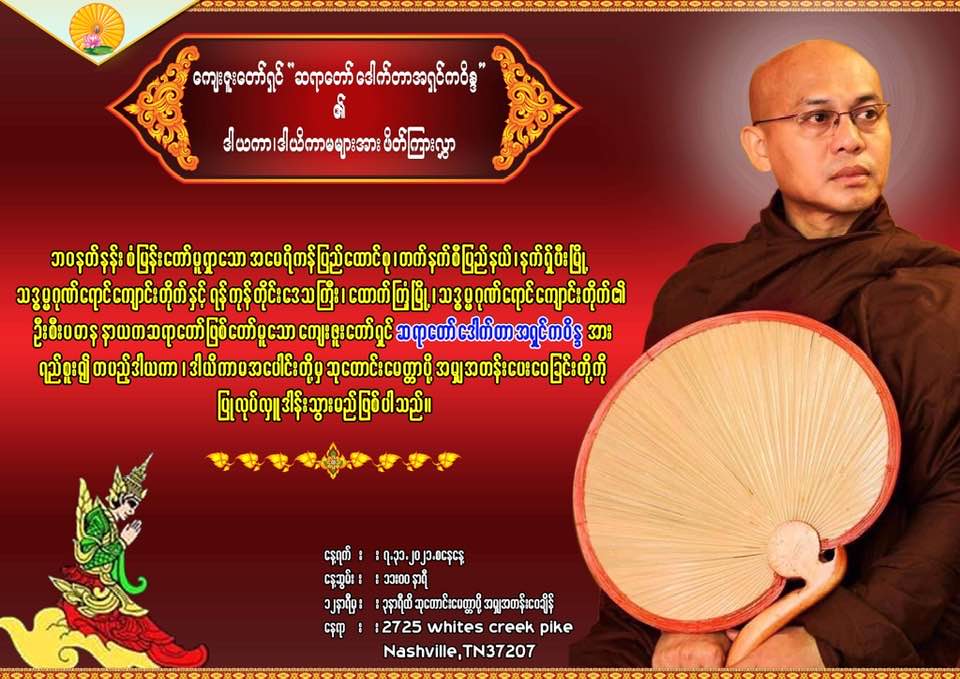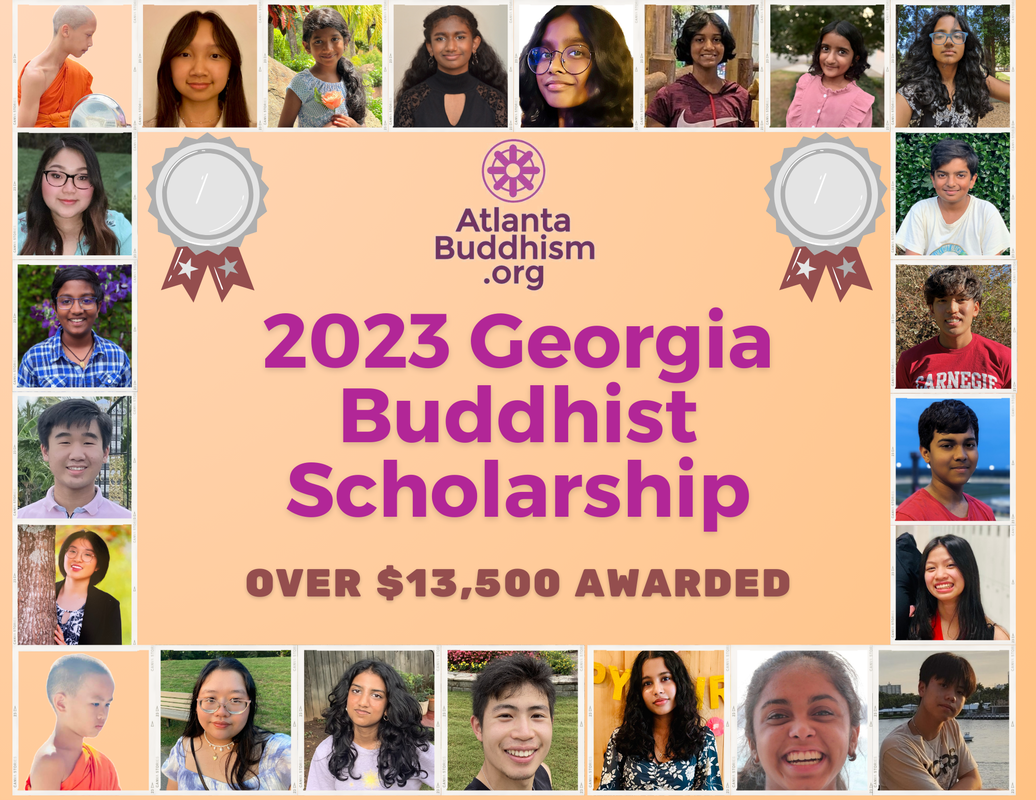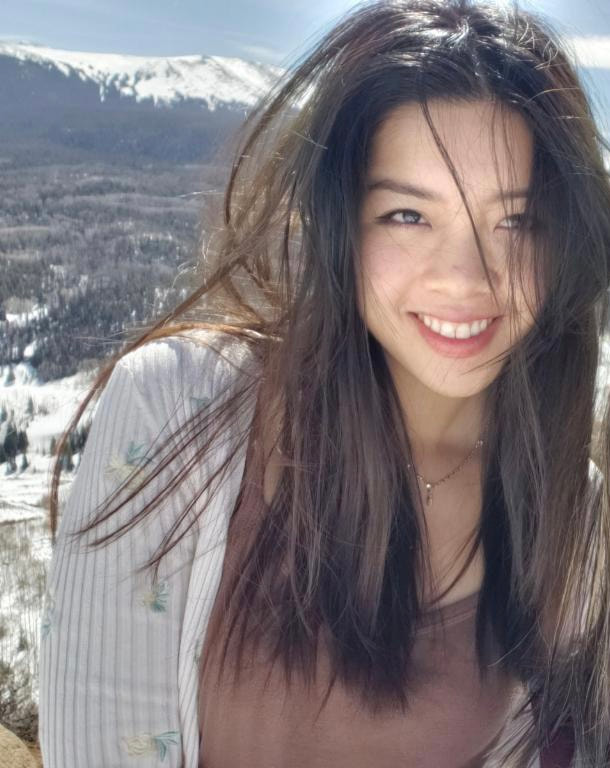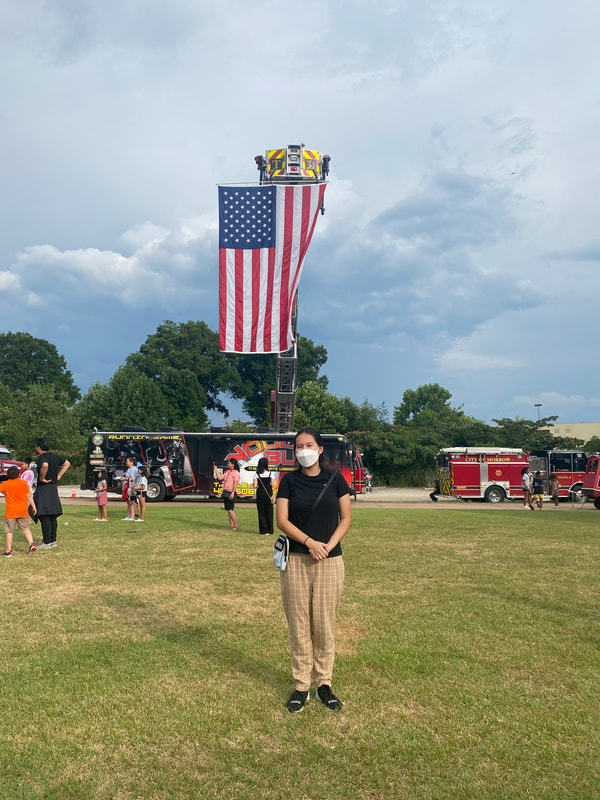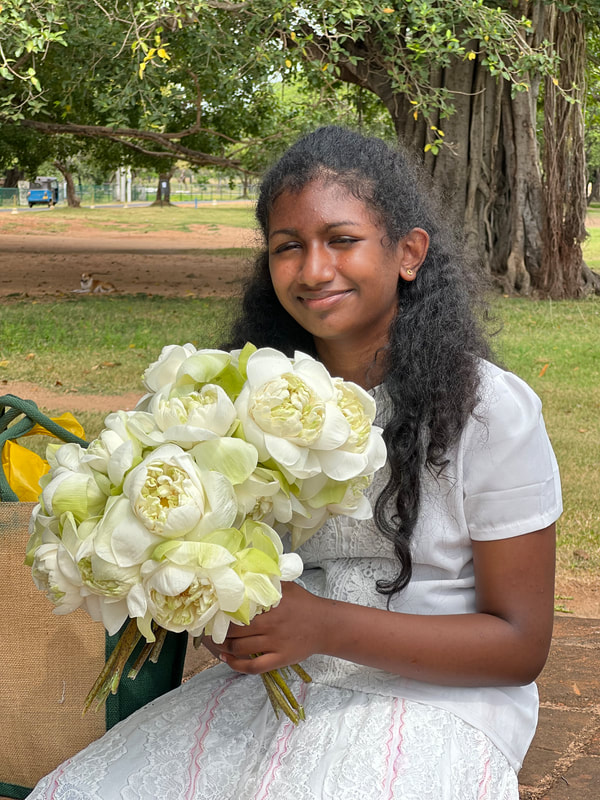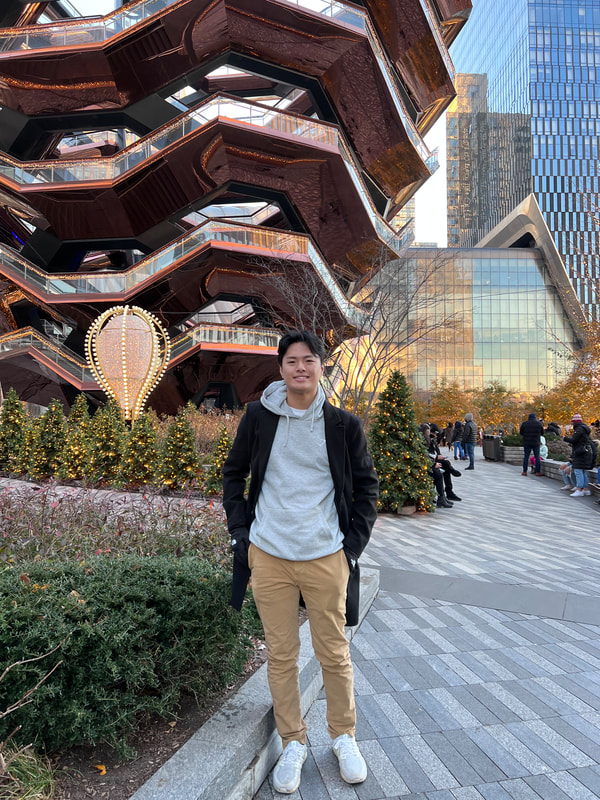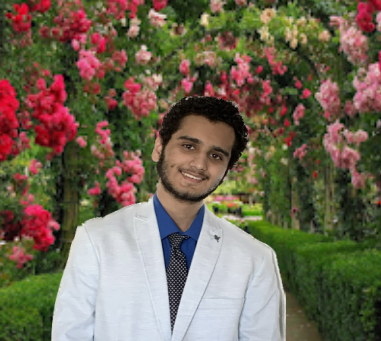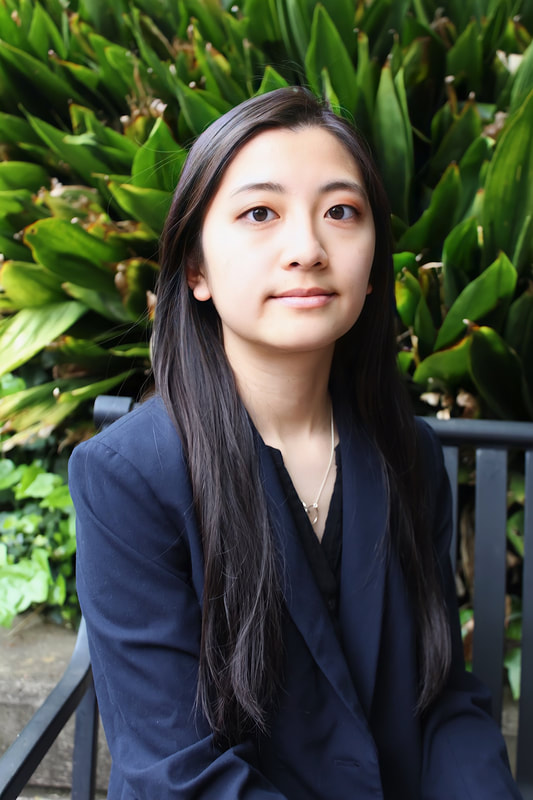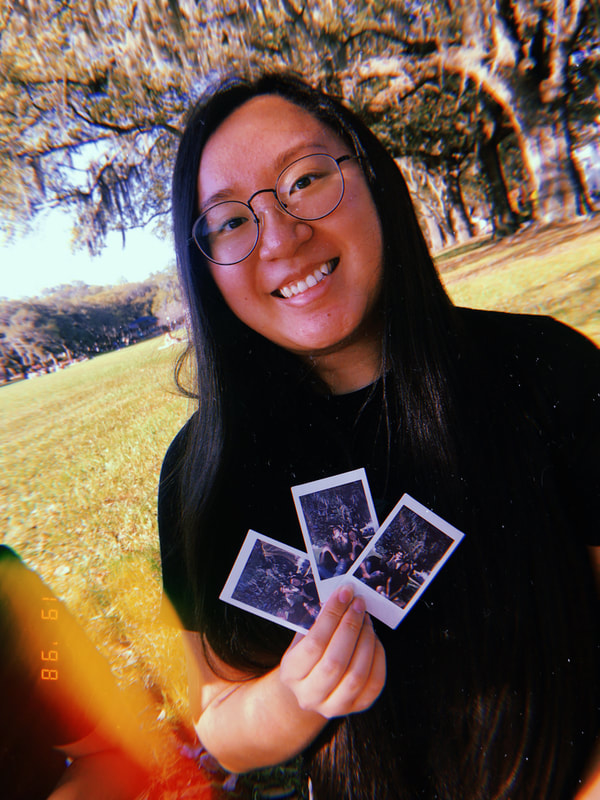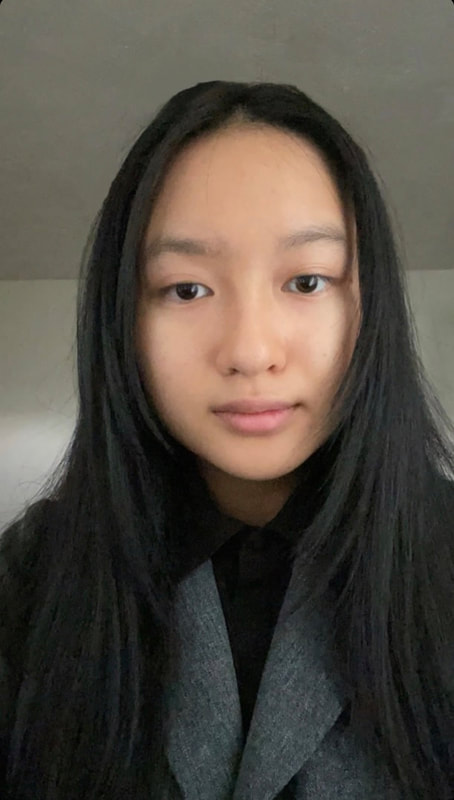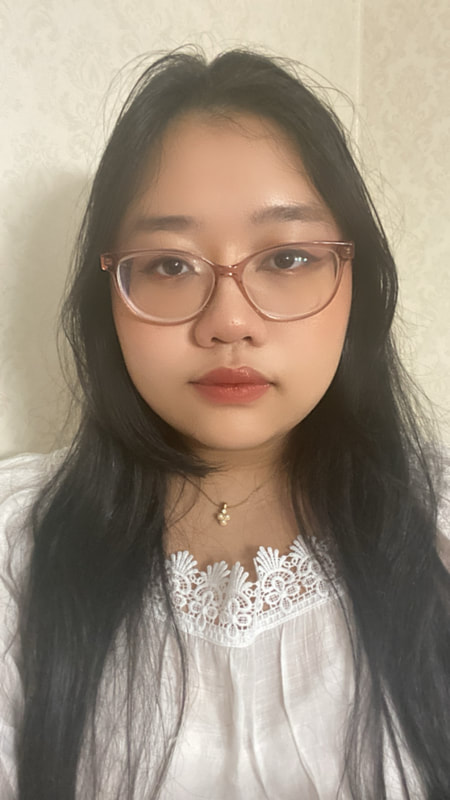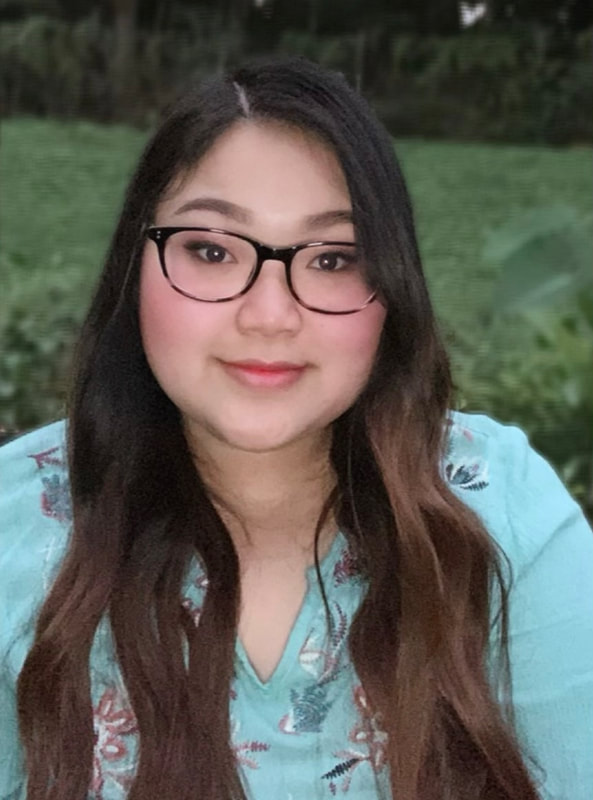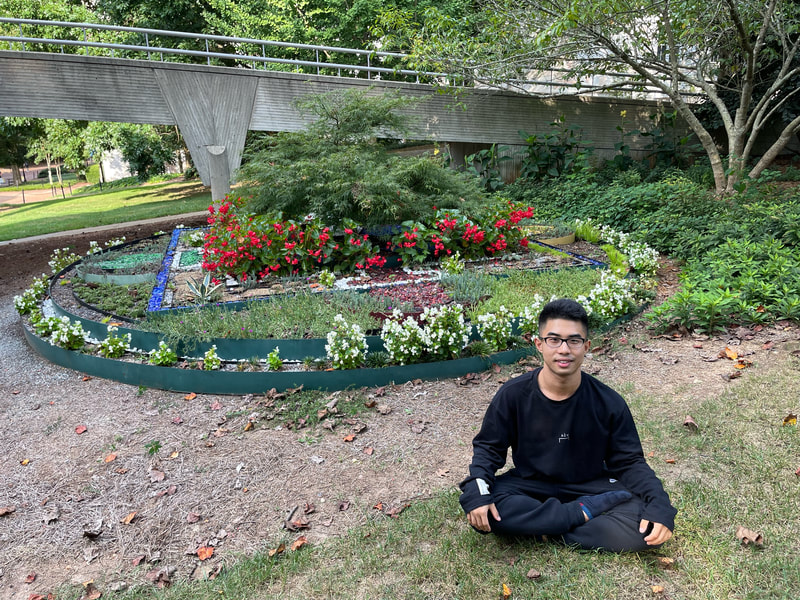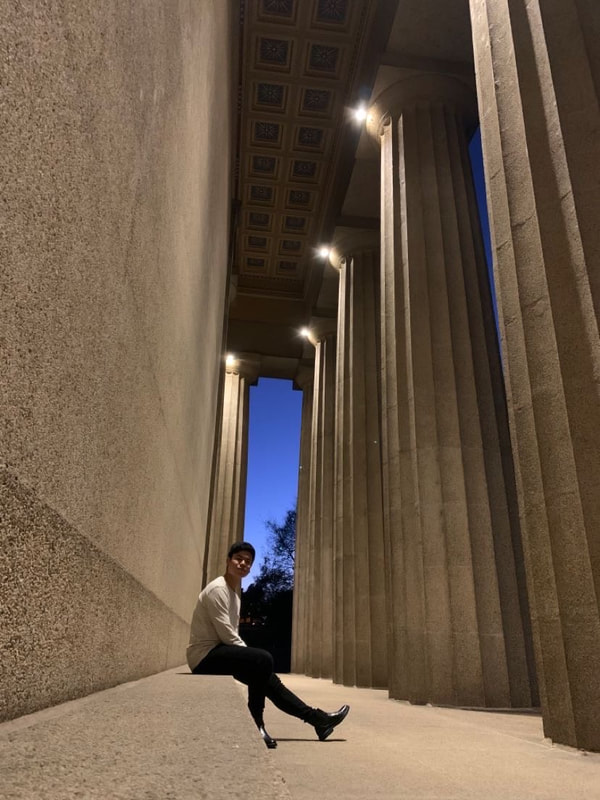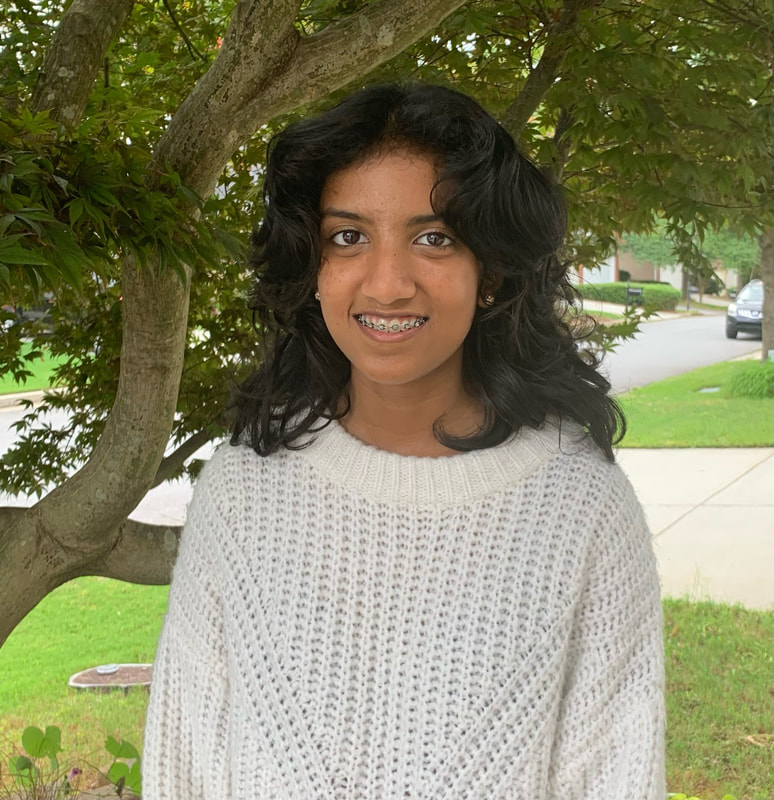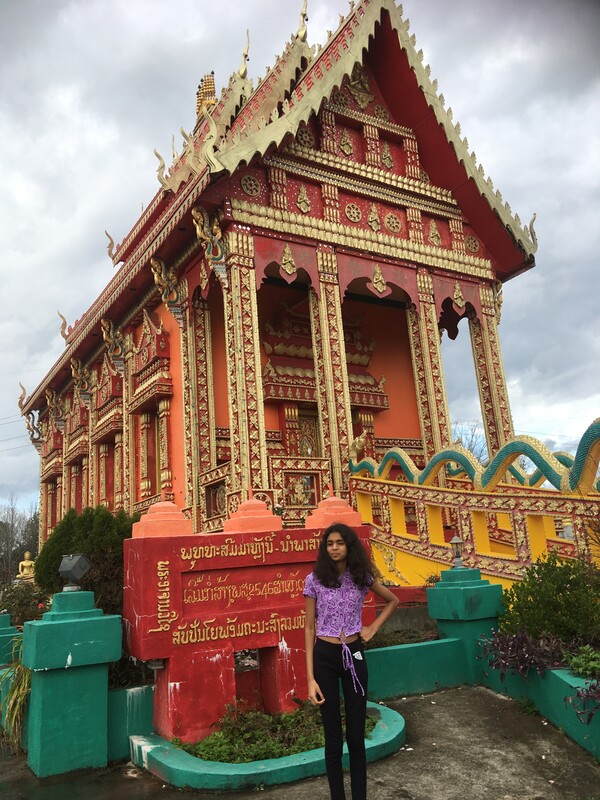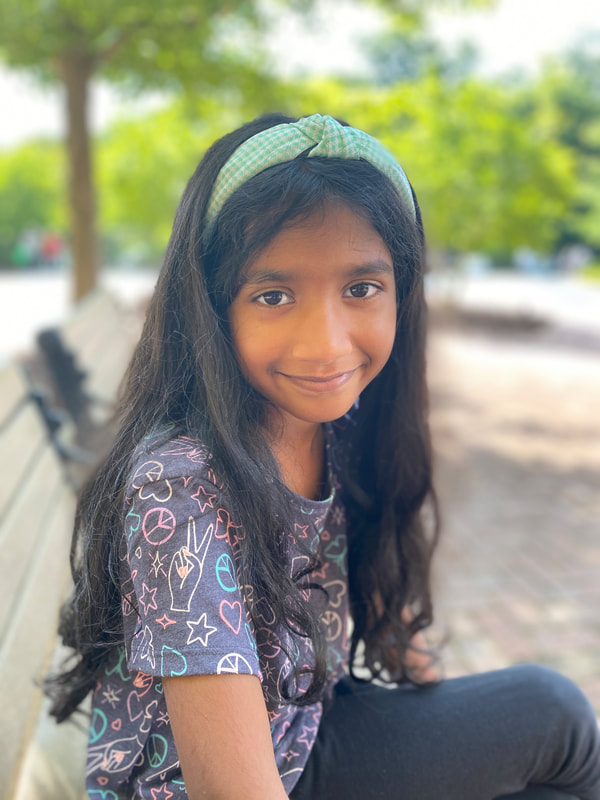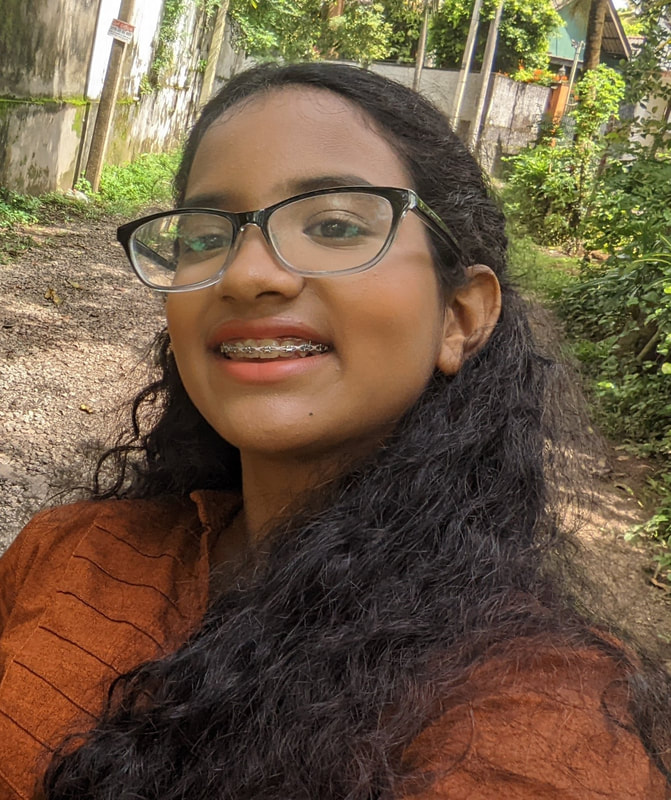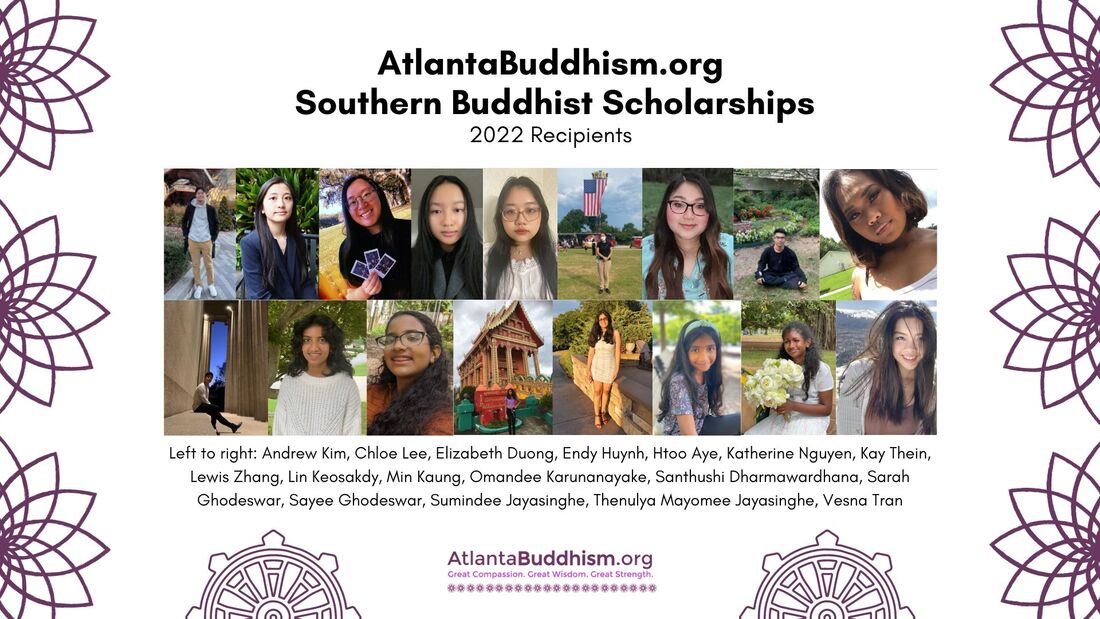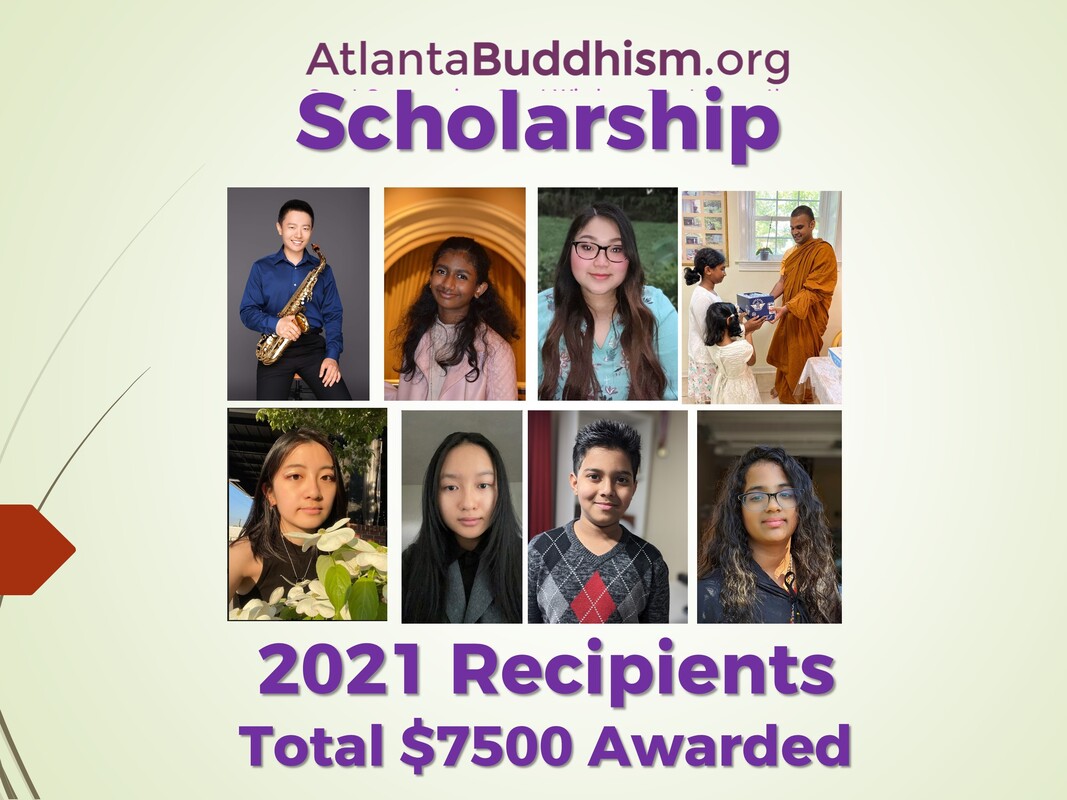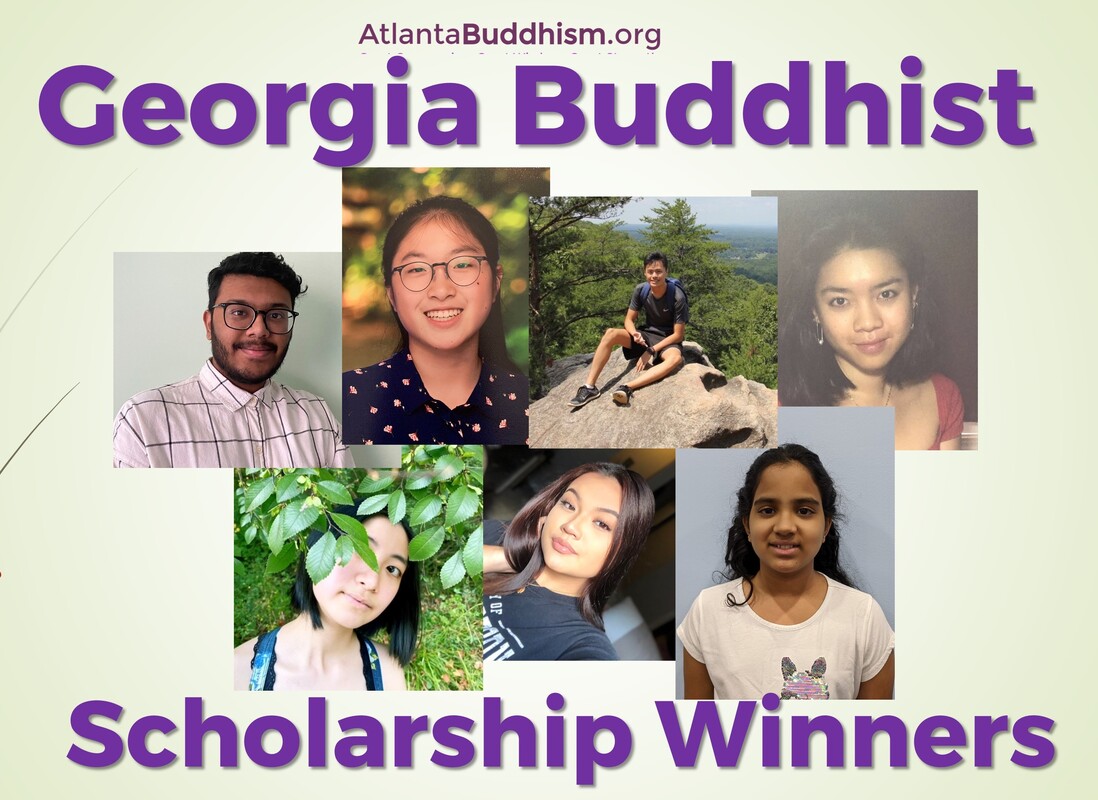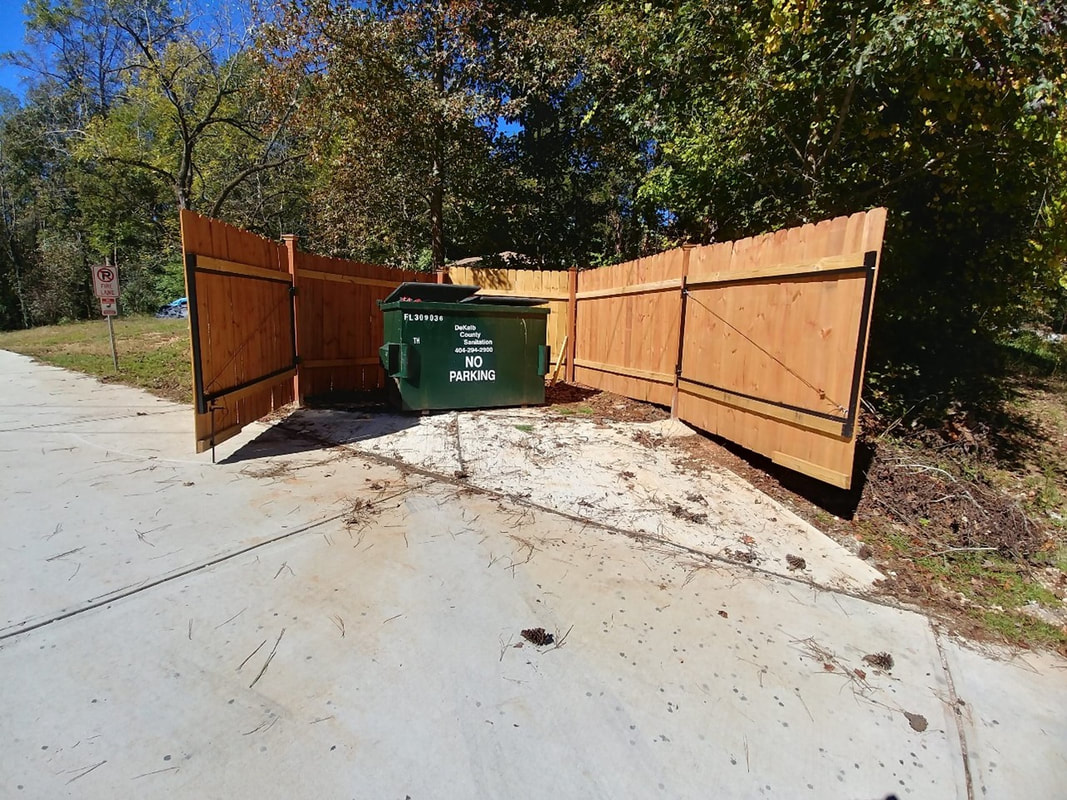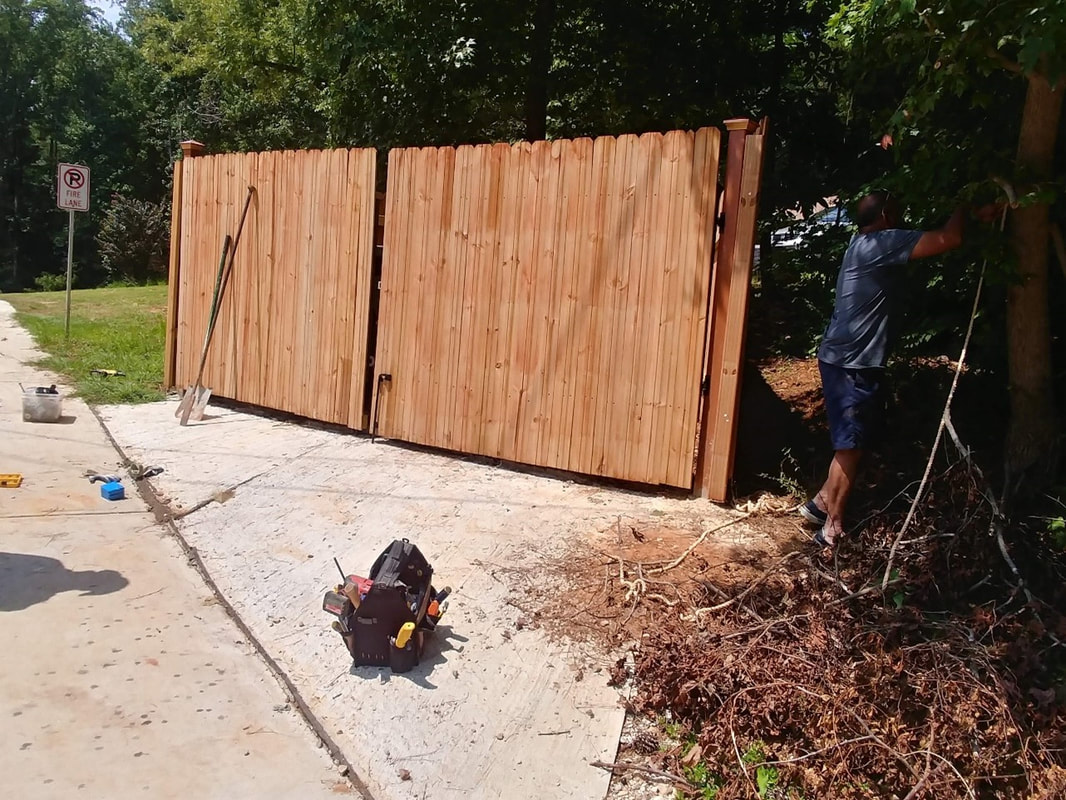Georgia Buddhist Scholarship
|
Additional Opportunities and Past Recipients Below:

Sangha Scholarship:
$20,000 grant over four years ($5000/year) for Southern students accepted to the Sangha and Laity Training Program at the Sagely City of Dharma Realm in California, or given in some special circumstances to students accepted to Dharma Realm Buddhist University! |
Youth Explorers Award (Summer Camp Scholarship)For any student with financial need, this fund will cover tuition and expenses to attend Georgia Buddhist Summer Camp
|
Past Award Winners

Congratulations Georgia Buddhist Scholarships 2024 Recipients:
Each prize amount includes our purchase of $100 gift card to Buddhismforkids.net / Buddhist Text Translation Society (www.buddhisttexts.org) and $50-100 to VeGreen or Vegreen2Go or VeGreen Noodle vegan restaurants!
Award for Adult Monastic to Continue Studies ($1000):
Grand Prize for Graduate School Student ($700):
Award for Best Art Work ($250):
Award for College & Graduate Students ($400):
Award for High School Students ($300):
Award for Middle School Students ($300):
Award for Elementary School Students ($200):
Encouragement Award for Summer Ordination at Wat Dhamma ($150):
Sangharakkhito (Dacula Middle School), Rakkhitamano Johnathan Lim (Dutchtown Middle School), Kalyanantharo Jacobi Lin (Dutchtown Middle School), Jayarakkhito Udom Touch (Kendrick Middle School), Angasopano Skylar Seng (MD Roberts Middle School), Yassatharo Pheareak Chamroeun (King Elementary School)
Encouragement Award for Participation ($100 : Buddhist Text Translation Society Gift Card):
Monastic Travel to Retreats & Georgia Buddhist Summer Camp (~$5000 total)
Various Venerables, including local and from Dharma Realm Buddhist University, Drepung Loseling Institute of Texas, Berkeley Buddhist Monastery, and more…
See below for some of the winning entries:
This year's prompt for the scholarship was:
How does participating in activities at a Buddhist temple or meditation center help you grow? You can describe your activities - for example, attending chanting and prayers, doing community service and cleaning up, donating food to monastics, teaching younger children, joining group meditation, connecting with your grandparents, etc, and what they mean to you.
If you do not attend a Buddhist temple, monastery, or meditation group, you can describe your learning or practices at home or elsewhere and how you use them in your life.
Each prize amount includes our purchase of $100 gift card to Buddhismforkids.net / Buddhist Text Translation Society (www.buddhisttexts.org) and $50-100 to VeGreen or Vegreen2Go or VeGreen Noodle vegan restaurants!
Award for Adult Monastic to Continue Studies ($1000):
- Ven. Sochen Sao, Georgia Perimeter Technical College, Cambodian Buddhist Society
- Saccathari Chum Sakada, Mt. Zion High School, Wat Dhamma
- Cittatanta Chorda Chum, Elite Scholars Middle School, Wat Dhamma
Grand Prize for Graduate School Student ($700):
- Vesna Tran, Johns Hopkins University, Truc Lam Bao Chi Temple
- Paige Scanlon, Emory University, Emory-Tibet Science Initiative / Shambhala Meditation Center of Atlanta
- Hannah Tran, Woodland High School, Kim Cang Monastery
- Thenulya Jayasinghe, Marietta Middle School, Georgia Buddhist Vihara
- Sumindee Jayasinghe, West Side Elementary, Mahamevnawa Buddhist Meditation Center of Atlanta
Award for Best Art Work ($250):
- Selini Karunanayake, Kittredge Magnet Elementary School, Georgia Buddhist Vihara
- Kio Whitten, Emory Buddhist Club, Emory University
- Brendan Tran, STEM School Chattanooga, Buddha Blessed Temple
Award for College & Graduate Students ($400):
- Anh Dang, Georgia Tech, Chua Quan The Am Temple
- Benjamin Kerbey, Emory University, Emory Buddhist Club
- Cimaya McCreary, Kennesaw State University
- Elizabeth Duong, Savannah College of Art and Design, The Vietnamese Buddhist Association of Savannah
- Endy Huynh, University of Pennsylvania, Chua Hai An Temple
- Eric Pham, Georgia State University, Kim Cang Monastery
- Ethan Lam, Medical University of South Carolina, Bao An Temple
- Kio Whitten, Emory Buddhist Club, Emory University (included in Community Service award)
- Paige Scanlon, Emory University, Shambhala Meditation Center of Atlanta (included in Grand Prize award)
- Ven. Sochen Sao, Georgia Perimeter Technical College, Cambodian Buddhist Society (included in Adult Monastic award)
- Vesna Tran, Johns Hopkins University, Truc Lam Bao Chi Temple (included in Grand Prize award)
Award for High School Students ($300):
- Andy Tran, Mill Creek High School, Bao Chi Temple
- Brandon Thai, Mill Creek High School, Bao Chi Temple
- Brendan Tran, STEM School Chattanooga, Buddha Blessed Temple (included in Buddhism Journey for Youth Award)
- Cathy Aung, Woodland High School, Ratana Viman Monastery
- Clara Phung, Brookwood High School, Drepung Loseling Monastery
- Daniel Tran, Woodland High School, Kim Cang Monastery
- Dylan Lam, J.L. Mann High School, Bao An Temple
- Hannah Tran, Woodland High School, Kim Cang Monastery (included in Grand Prize award)
- Ishara Wijeratne, Woodward Academy, Georgia Buddhist Vihara
- Omandee Karunanayake, Chamblee High School, Georgia Buddhist Vihara
- Royce Pham, Mountain View High School, Bao Chi Temple
- Santhushi Dharmawardhana, Chattahoochee High School, Georgia Buddhist Vihara
- Saccathari Chum Sakada, Mt. Zion High School, Wat Dhamma (included in Novice Monk award)
Award for Middle School Students ($300):
- Ai Linh Nguyen, Haynes Bridge Middle School, Bao Chi Temple
- Cittatanta Chorda Chum, Elite Scholars Middle School, Wat Dhamma (included in Novice Nun award)
- Damsas Dharmawardhana, Taylor Road Middle School, Georgia Buddhist Vihara
- Kalana Karunanayake, Kittredge Magnet School, Georgia Buddhist Vihara
- Minuli Liyanarachchi, Bay Creek Middle School, Georgia Buddhist Vihara
- Saccavati Roza Huor, North Clayton Middle School, Wat Dhamma
- Thenulya Jayasinghe, Marietta Middle School, Georgia Buddhist Vihara (included in Grand Prize award)
Award for Elementary School Students ($200):
- Chantasuttho Dominic Ly, Dacula Elementary School, Wat Dhamma
- Kema Kaylee Khor, Dutchtown Elementary School, Wat Dhamma
- Selini Karunanayake, Kittredge Magnet Elementary School, Georgia Buddhist Vihara (included in Best Art award)
- Sumindee Jayasinghe, West Side Elementary, Mahamevnawa Buddhist Meditation Center of Atlanta (included in Grand Prize award)
Encouragement Award for Summer Ordination at Wat Dhamma ($150):
Sangharakkhito (Dacula Middle School), Rakkhitamano Johnathan Lim (Dutchtown Middle School), Kalyanantharo Jacobi Lin (Dutchtown Middle School), Jayarakkhito Udom Touch (Kendrick Middle School), Angasopano Skylar Seng (MD Roberts Middle School), Yassatharo Pheareak Chamroeun (King Elementary School)
Encouragement Award for Participation ($100 : Buddhist Text Translation Society Gift Card):
- Oanh Anna Duong, adult, Chua Linh Phong
- Vo Le, West Georgia Technical College, Cao Dai Temple
- John Mai, University of South Carolina Columbia, Bao An Temple
- Kelly Nguyen, Riverwood International Charter School, Chua Quang Minh
- Savinu Liyanarachchi, Tripp Elementary School, Georgia Buddhist Vihara
Monastic Travel to Retreats & Georgia Buddhist Summer Camp (~$5000 total)
Various Venerables, including local and from Dharma Realm Buddhist University, Drepung Loseling Institute of Texas, Berkeley Buddhist Monastery, and more…
See below for some of the winning entries:
This year's prompt for the scholarship was:
How does participating in activities at a Buddhist temple or meditation center help you grow? You can describe your activities - for example, attending chanting and prayers, doing community service and cleaning up, donating food to monastics, teaching younger children, joining group meditation, connecting with your grandparents, etc, and what they mean to you.
If you do not attend a Buddhist temple, monastery, or meditation group, you can describe your learning or practices at home or elsewhere and how you use them in your life.
This year's Art Winner, Selini Karunanayake, 5th Grade, from Georgia Buddhist Vihara
About our College Winner:
Hello! My name is Paige Scanlon and I am incredibly grateful to be the recipient of this year’s
college division Georgia Buddhist scholarship. This award will directly benefit my current
research on Buddhist nuns and those that I am learning from–I am sending a big thank you to all
of those that made this possible! I am currently a rising senior at Emory University studying
Religion and Interdisciplinary Studies of Society and Culture (IDS). For my IDS senior thesis, I
have been conducting ethnographic research in Dharamsala and Zangskar, India and Atlanta on
nuns practicing Tibetan Buddhism. Said most simply, I look to explore how these women make
sense of their experiences in the nunnery through their minds and bodies. I owe any and all
success to those that introduced and welcomed me into my first Buddhist sanghas. Emory
Buddhist Club, headed by Buddhist chaplain Venerable Priya, first empowered me to explore the
questions left unanswered as a first-year student. Atlanta Shambhala Center continued to provide
a safe space to learn the basics of meditating the summer after my first year of college. The
Tibetan Mind and Body Sciences Summer (TMBS) Program of Summer 2023, directed by the
wonderful Geshe Negi-la, was one of the most transformative experiences of my life that gave
me a much stronger foundation in Buddhism and pushed me to explore the culture of monastic
life more deeply. In the fall semester after TMBS, I was blessed to form close connections with
the group of two nuns and four monks part of the Tenzin Gyatso cohort at Emory. Each of them
inspired me to pursue research in Buddhist studies more long term, which first manifested in a
qualitative research study on their relationships with movement and exercise. It was a complete
and utter joy to spend time moving with them, which I believe to be one of the foundations of
our friendships. Later on, the monks and nuns taught me many other things: speaking Tibetan,
making momo dumplings, and important life lessons. The Buddhist community has offered me a
space to be a better student, friend, daughter, and human in general. I hope that I can continue to
look to my peers and mentors as inspiration, cultivating compassion and wisdom with every step.
In the future, I intend on continuing my involvement with monastic communities, perhaps in
Nepal with various nonprofits. Wherever I end up, though, I will strive to remain enmeshed in
Buddhist communities and give back to those that have given me everything through their
kindness!
Hello! My name is Paige Scanlon and I am incredibly grateful to be the recipient of this year’s
college division Georgia Buddhist scholarship. This award will directly benefit my current
research on Buddhist nuns and those that I am learning from–I am sending a big thank you to all
of those that made this possible! I am currently a rising senior at Emory University studying
Religion and Interdisciplinary Studies of Society and Culture (IDS). For my IDS senior thesis, I
have been conducting ethnographic research in Dharamsala and Zangskar, India and Atlanta on
nuns practicing Tibetan Buddhism. Said most simply, I look to explore how these women make
sense of their experiences in the nunnery through their minds and bodies. I owe any and all
success to those that introduced and welcomed me into my first Buddhist sanghas. Emory
Buddhist Club, headed by Buddhist chaplain Venerable Priya, first empowered me to explore the
questions left unanswered as a first-year student. Atlanta Shambhala Center continued to provide
a safe space to learn the basics of meditating the summer after my first year of college. The
Tibetan Mind and Body Sciences Summer (TMBS) Program of Summer 2023, directed by the
wonderful Geshe Negi-la, was one of the most transformative experiences of my life that gave
me a much stronger foundation in Buddhism and pushed me to explore the culture of monastic
life more deeply. In the fall semester after TMBS, I was blessed to form close connections with
the group of two nuns and four monks part of the Tenzin Gyatso cohort at Emory. Each of them
inspired me to pursue research in Buddhist studies more long term, which first manifested in a
qualitative research study on their relationships with movement and exercise. It was a complete
and utter joy to spend time moving with them, which I believe to be one of the foundations of
our friendships. Later on, the monks and nuns taught me many other things: speaking Tibetan,
making momo dumplings, and important life lessons. The Buddhist community has offered me a
space to be a better student, friend, daughter, and human in general. I hope that I can continue to
look to my peers and mentors as inspiration, cultivating compassion and wisdom with every step.
In the future, I intend on continuing my involvement with monastic communities, perhaps in
Nepal with various nonprofits. Wherever I end up, though, I will strive to remain enmeshed in
Buddhist communities and give back to those that have given me everything through their
kindness!
Winning Essay #1
To My Younger Friend
“I want to stay here with you 100 days!”
Illuminating me with his wide-eyed beaming expression proudly standing at less than 4ft,
his words were adorned with earnest innocence as he wrapped his mighty and mini arms around
my legs for an embrace. My closest confidant at my first Buddhist summer camp fresh after high
school graduation rapidly revealed to be none other than a darling young boy with a distinct
distaste for carrots - like myself - and who would joke, “fly eye!” at least 4x a day - each time as
if it was the first as he slapped his palm against his eye giggling - in remembrance of a fateful
moment of when a fly flew into his eyes during hiking. The moment washed our connection
from one of polite and shy smiles encapsulated within brief encounters to one of “carrot
competitions” during lunchtime to add a flair of thrill towards meeting daily nutritional values.
I remember him so vividly sometimes. Being used to circulating my own thoughts and
emotional experiences more within myself, I warmed with fondness over his honest and open
expressions of affection and perspectives.
One evening as the last strings of sunlight swiveled through the cracks in the canopy
leaves above, I walked along the paved road to spend some time in reflective solitude when I
heard a familiar voice.
“Wait for me!”
Sounds of shoe soles slapping pavement swiftly approach and stop right next me replaced
by the rhythms of huffing breaths. He looked up at me still with the beaming wide-toothed smile
and asked if he could join me. We then walked and laughed when he stopped abruptly, and in an
exaggerated fashion, jumped down into a squat with his arms spread wide to look inquisitively in
worry at a point in the ground that was obstructed to me.
“Ewwwww. What is that?”
It was a caterpillar - a very furry one at that.
“Why is it striped and red?”
My friend continued to look at it with slight disbelief and slight fear and having slightly
recovered after some time, began to cautiously move sticks and debris out of its path towards the
dirt.
“We learned today in class that we can’t kill animals because they have souls. We need to
protect them,” he said, although still faintly flinching whenever the caterpillar makes an
unexpected move.
He was referring to one of the daily class pods that divide attendees up according to our
ages. In mine, we were contemplating our values and attachments, and in his, I guess on the
value of all life forms. His words and actions in this moment had moved me as I thought 1. He
was clearly afraid of this unknown creature but is protecting it. How often do we as individuals
and as a collective judge or destroy what we fear and cannot understand? I thought of my fear of
spiders and wondered if I would have done the same and 2. He was truly understanding and
implementing what was being relayed to him in classes of children whose presence was largely
the result of their parents’ intentions.
You see, perhaps it was my own projection as I was one of those children from 8 to about
15 years old enrolled into a Buddhist Youth Program where I would attend weekly prayers,
chants, and Buddhist & Vietnamese language lessons. My memory illustrates me of a time of
absorbing the rhythms of sino-Vietnamese sounds and reciting the dates and events of the
Buddha’s life and teachings, but it was from a product of memorization rather than
understanding, a contrast that became more and more apparent to me throughout my schooling.
What enlivened me instead was time spent with friends there around a big circle playing games
like sinking human “battleships” with Vietnamese poetry or preparing faintly awkward fan
dances for the annual celebrations of Buddha’s birthday and Vu Lan.
With Buddhism, it was only until I reached a later age wrapped up in flashes of stress
from my academic path and anxiety from planning its future while starting to discover what it
means to honor my own intentions for myself that I felt myself gravitating towards Buddhist
philosophy with a different heart. I find the same flow towards religion increasingly more now as
my worldly demands draw more complexity, and as my perspective develops, I find more and
more traces of this seed in my mind space as pieces of teachings increasingly coagulate together
as offerings of guidance, acting as a gentle stream flowing over muddy rocks.
To reflect on my growth from participating in activities at Buddhist communities, I find
traces of fingerprints from the hands of Buddhist philosophy in my mind, shaping my eyes on
how they discern and my heart on how it feels about the world.
I find it in the way I feel a sense of refuge and relief in my chest when exploring a new
country and encountering a temple, or in the way I float towards the sections of philosophy,
religion and spirituality in bookstores for the texts of monk Thich Nhat Hanh and the Dalai Lama
for example.
I find it in my meditation practice crafted from the footsteps of attending local and global
retreats and communities and in my yoga practice where the principles of non-attachment and
self-compassion embody themselves throughout my pose transitions and breath.
I find it in the way I’m practicing to communicate to my friends and family and in how
I’m choosing to react to myself and others in situations where I feel provoked, scared, stirred,
and indignant to bring as much space I can muster for warmth, gentleness, vulnerability, and
strength instead.
I found it that day in my younger friend who had provoked this line of thought within me
with his act of fresh compassion. The Buddhist camp that year had brought a greater value on
community for me, influencing my decisions to pursue volunteering to teach English lessons in
South America for example or to deepen my yoga and meditation practice further by becoming a
trauma-informed instructor. I found more clarity in the power of education especially for
flexible, curious minds and for minds that were more structurally challenged like through
becoming a behavioral technician for students with Autism Spectrum Disorder. My narration
here is the closest accessibility I have to relate how much of influence and growth participating
and understanding Buddhism has led me to as more pieces will undoubtedly uncover, the seed
that was cultivated unconsciously during my childhood slowly blossoming in my subconscious
and peaking through gradually to my awareness. I found the kindness of community, of
contribution, and of service and in doing so, am finding more and more consciousness in my
spiritual, emotional, and societal path.
To my younger friend, I hope he’s found the traces of this seed too, discerning which
parts feel most in alignment with him. I hope he’s still clearing paths for these small creatures.
“Ok! Let’s keep going!”
To My Younger Friend
“I want to stay here with you 100 days!”
Illuminating me with his wide-eyed beaming expression proudly standing at less than 4ft,
his words were adorned with earnest innocence as he wrapped his mighty and mini arms around
my legs for an embrace. My closest confidant at my first Buddhist summer camp fresh after high
school graduation rapidly revealed to be none other than a darling young boy with a distinct
distaste for carrots - like myself - and who would joke, “fly eye!” at least 4x a day - each time as
if it was the first as he slapped his palm against his eye giggling - in remembrance of a fateful
moment of when a fly flew into his eyes during hiking. The moment washed our connection
from one of polite and shy smiles encapsulated within brief encounters to one of “carrot
competitions” during lunchtime to add a flair of thrill towards meeting daily nutritional values.
I remember him so vividly sometimes. Being used to circulating my own thoughts and
emotional experiences more within myself, I warmed with fondness over his honest and open
expressions of affection and perspectives.
One evening as the last strings of sunlight swiveled through the cracks in the canopy
leaves above, I walked along the paved road to spend some time in reflective solitude when I
heard a familiar voice.
“Wait for me!”
Sounds of shoe soles slapping pavement swiftly approach and stop right next me replaced
by the rhythms of huffing breaths. He looked up at me still with the beaming wide-toothed smile
and asked if he could join me. We then walked and laughed when he stopped abruptly, and in an
exaggerated fashion, jumped down into a squat with his arms spread wide to look inquisitively in
worry at a point in the ground that was obstructed to me.
“Ewwwww. What is that?”
It was a caterpillar - a very furry one at that.
“Why is it striped and red?”
My friend continued to look at it with slight disbelief and slight fear and having slightly
recovered after some time, began to cautiously move sticks and debris out of its path towards the
dirt.
“We learned today in class that we can’t kill animals because they have souls. We need to
protect them,” he said, although still faintly flinching whenever the caterpillar makes an
unexpected move.
He was referring to one of the daily class pods that divide attendees up according to our
ages. In mine, we were contemplating our values and attachments, and in his, I guess on the
value of all life forms. His words and actions in this moment had moved me as I thought 1. He
was clearly afraid of this unknown creature but is protecting it. How often do we as individuals
and as a collective judge or destroy what we fear and cannot understand? I thought of my fear of
spiders and wondered if I would have done the same and 2. He was truly understanding and
implementing what was being relayed to him in classes of children whose presence was largely
the result of their parents’ intentions.
You see, perhaps it was my own projection as I was one of those children from 8 to about
15 years old enrolled into a Buddhist Youth Program where I would attend weekly prayers,
chants, and Buddhist & Vietnamese language lessons. My memory illustrates me of a time of
absorbing the rhythms of sino-Vietnamese sounds and reciting the dates and events of the
Buddha’s life and teachings, but it was from a product of memorization rather than
understanding, a contrast that became more and more apparent to me throughout my schooling.
What enlivened me instead was time spent with friends there around a big circle playing games
like sinking human “battleships” with Vietnamese poetry or preparing faintly awkward fan
dances for the annual celebrations of Buddha’s birthday and Vu Lan.
With Buddhism, it was only until I reached a later age wrapped up in flashes of stress
from my academic path and anxiety from planning its future while starting to discover what it
means to honor my own intentions for myself that I felt myself gravitating towards Buddhist
philosophy with a different heart. I find the same flow towards religion increasingly more now as
my worldly demands draw more complexity, and as my perspective develops, I find more and
more traces of this seed in my mind space as pieces of teachings increasingly coagulate together
as offerings of guidance, acting as a gentle stream flowing over muddy rocks.
To reflect on my growth from participating in activities at Buddhist communities, I find
traces of fingerprints from the hands of Buddhist philosophy in my mind, shaping my eyes on
how they discern and my heart on how it feels about the world.
I find it in the way I feel a sense of refuge and relief in my chest when exploring a new
country and encountering a temple, or in the way I float towards the sections of philosophy,
religion and spirituality in bookstores for the texts of monk Thich Nhat Hanh and the Dalai Lama
for example.
I find it in my meditation practice crafted from the footsteps of attending local and global
retreats and communities and in my yoga practice where the principles of non-attachment and
self-compassion embody themselves throughout my pose transitions and breath.
I find it in the way I’m practicing to communicate to my friends and family and in how
I’m choosing to react to myself and others in situations where I feel provoked, scared, stirred,
and indignant to bring as much space I can muster for warmth, gentleness, vulnerability, and
strength instead.
I found it that day in my younger friend who had provoked this line of thought within me
with his act of fresh compassion. The Buddhist camp that year had brought a greater value on
community for me, influencing my decisions to pursue volunteering to teach English lessons in
South America for example or to deepen my yoga and meditation practice further by becoming a
trauma-informed instructor. I found more clarity in the power of education especially for
flexible, curious minds and for minds that were more structurally challenged like through
becoming a behavioral technician for students with Autism Spectrum Disorder. My narration
here is the closest accessibility I have to relate how much of influence and growth participating
and understanding Buddhism has led me to as more pieces will undoubtedly uncover, the seed
that was cultivated unconsciously during my childhood slowly blossoming in my subconscious
and peaking through gradually to my awareness. I found the kindness of community, of
contribution, and of service and in doing so, am finding more and more consciousness in my
spiritual, emotional, and societal path.
To my younger friend, I hope he’s found the traces of this seed too, discerning which
parts feel most in alignment with him. I hope he’s still clearing paths for these small creatures.
“Ok! Let’s keep going!”
Winning Essay # 2
The word, “grow” has many meanings correlated to it. According to the textbook definition,
“grow” means to “undergo natural development by increasing in size and changing physically”.
However, I believe to grow is to be able to understand. Participating in activities at a Buddhist temple
helped me further enhance my knowledge regarding Buddhism. As I attended temple services, helped
set up big events, participated in Buddhist camps, prayed, etc., I grew more mindful and appreciative
of what was around me. For some people, growing is defined as a change that they can see, whether
it be changes to them physically or visible changes to things around them. I believe that actively
participating in activities at a Buddhist temple helped me grow more stable mentally and enhanced
my understanding of this religion.
As a child, I went to a temple called “Chùa Từ Liên” and acquired my Dharma name or as it
is called in Vietnamese, my “pháp danh” there. However, circumstances led to my family moving to
a different part of the state where going to this temple had become inconvenient. Chùa Kim Cang
(Kim Cang Monastery), a monastery closer to us, had become my family’s second home. So, while
most families have only one temple that they regularly dedicate themselves to, my family had two.
When Buddhist festivals occurred (Vu Lan Festival, Vesak Day, etc.), I was involved in the events of
both temples. For example, there was a time where I had participated in the dances for the upcoming
Vu Lan Festivals for both Kim Cang and Tu Lien Monastery. Both these temples were around an
hour apart and I remember quickly running from one temple to the other on days where we practiced
the dances.
On the days of the festivals, my family would come early to help prepare the food, set up the
food offerings, set up chairs and decorations, and would stay back after the festival to help clean up.
As I helped out at both these temples every year, I observed the different environments that both
these temples emitted. The way the events were organized, the way each temple prepared the food,
the way the decorations were set up were all so different and yet, something remained the same.
Throughout the many years that I have participated in helping out both temples, I realized that both
of them shared a strong knit community. No matter how different the temples were, no matter how
different any temple is, all temples share the support of a bonded community. A community that is
connected by their unwavering belief in Buddhism. A community that is there for each other. And, I
was fortunate to be a part of two of these communities.
Why am I doing this? This question replayed over and over in my head for years as I continued to attend and help out temples. I participated in my temple’s GDPT, folded envelopes and invitations, helped carry chairs for events, joined and helped out the Vietnamese classes, attended the
monthly Dharma days dedicated to kids, prayed and chanted, played piano for temples, danced at the
Buddhist events, etc. But, I couldn’t help but wonder. Why am I doing this? How does this benefit
me? Am I just wasting my time? For years, these questions roamed my head, unanswered and
pending. As I grew up though, things began to click. It was like a light bulb had switched on at a
certain point in time, clearing my brain of my confusions. I started to look forward to going and
helping out at the temple, eager to learn about the teachings of the Buddha, ready to clear all the
clouded thoughts in my mind. I participated in these activities because I enjoyed it. I felt the benefit
of sharpening my knowledge in Buddhism. Most importantly, I felt myself grow.
Although I couldn’t see it, I could feel myself growing as I continued to participate in these
activities. To name a few, helping out the kitchen staff and leading the younger children taught me
patience and cooperation skills, praying and chanting the Dharma helped me clear my clouded
thoughts and helped me understand Buddhism better, and meditating sessions allowed me to reflect
on my actions, live in the present moment, and become more mindful in my way of thinking.
Buddha’s teachings began to integrate more into my daily life, allowing me to learn to let things go
and be more mindful in everything that I do. That was the growth that I felt. It wasn’t tangible,
something that could be seen or touched, but it was something that I could feel. I began to feel my
growth through the understanding of Buddhism from these small activities performed at temples.
And, that growth ended up being a much bigger part of my life than I had ever expected.
So, instead of the dread of visiting and helping out two different temples every big occasion,
I have begun to anticipate and look forward to those days. I appreciate the privilege of being able to
attend and help out at two different monasteries. I cherish the moments spent helping out at temples
and see them as valuable lessons to be applied to my life. I understand what it means to be able to let
my emotions go and forgive. Buddha’s teachings are so valuable, yet it becomes meaningless if the
receiver does not truly believe these teachings to be true. Actively participating in helping out at
temples has allowed me to understand Buddha’s teachings. Something that I was unable to
comprehend before. Involvement in these activities taught me to understand, to value, and to respect
this religion that I wholeheartedly believe in. To understand is to grow, and these activities have
allowed me to understand.
The word, “grow” has many meanings correlated to it. According to the textbook definition,
“grow” means to “undergo natural development by increasing in size and changing physically”.
However, I believe to grow is to be able to understand. Participating in activities at a Buddhist temple
helped me further enhance my knowledge regarding Buddhism. As I attended temple services, helped
set up big events, participated in Buddhist camps, prayed, etc., I grew more mindful and appreciative
of what was around me. For some people, growing is defined as a change that they can see, whether
it be changes to them physically or visible changes to things around them. I believe that actively
participating in activities at a Buddhist temple helped me grow more stable mentally and enhanced
my understanding of this religion.
As a child, I went to a temple called “Chùa Từ Liên” and acquired my Dharma name or as it
is called in Vietnamese, my “pháp danh” there. However, circumstances led to my family moving to
a different part of the state where going to this temple had become inconvenient. Chùa Kim Cang
(Kim Cang Monastery), a monastery closer to us, had become my family’s second home. So, while
most families have only one temple that they regularly dedicate themselves to, my family had two.
When Buddhist festivals occurred (Vu Lan Festival, Vesak Day, etc.), I was involved in the events of
both temples. For example, there was a time where I had participated in the dances for the upcoming
Vu Lan Festivals for both Kim Cang and Tu Lien Monastery. Both these temples were around an
hour apart and I remember quickly running from one temple to the other on days where we practiced
the dances.
On the days of the festivals, my family would come early to help prepare the food, set up the
food offerings, set up chairs and decorations, and would stay back after the festival to help clean up.
As I helped out at both these temples every year, I observed the different environments that both
these temples emitted. The way the events were organized, the way each temple prepared the food,
the way the decorations were set up were all so different and yet, something remained the same.
Throughout the many years that I have participated in helping out both temples, I realized that both
of them shared a strong knit community. No matter how different the temples were, no matter how
different any temple is, all temples share the support of a bonded community. A community that is
connected by their unwavering belief in Buddhism. A community that is there for each other. And, I
was fortunate to be a part of two of these communities.
Why am I doing this? This question replayed over and over in my head for years as I continued to attend and help out temples. I participated in my temple’s GDPT, folded envelopes and invitations, helped carry chairs for events, joined and helped out the Vietnamese classes, attended the
monthly Dharma days dedicated to kids, prayed and chanted, played piano for temples, danced at the
Buddhist events, etc. But, I couldn’t help but wonder. Why am I doing this? How does this benefit
me? Am I just wasting my time? For years, these questions roamed my head, unanswered and
pending. As I grew up though, things began to click. It was like a light bulb had switched on at a
certain point in time, clearing my brain of my confusions. I started to look forward to going and
helping out at the temple, eager to learn about the teachings of the Buddha, ready to clear all the
clouded thoughts in my mind. I participated in these activities because I enjoyed it. I felt the benefit
of sharpening my knowledge in Buddhism. Most importantly, I felt myself grow.
Although I couldn’t see it, I could feel myself growing as I continued to participate in these
activities. To name a few, helping out the kitchen staff and leading the younger children taught me
patience and cooperation skills, praying and chanting the Dharma helped me clear my clouded
thoughts and helped me understand Buddhism better, and meditating sessions allowed me to reflect
on my actions, live in the present moment, and become more mindful in my way of thinking.
Buddha’s teachings began to integrate more into my daily life, allowing me to learn to let things go
and be more mindful in everything that I do. That was the growth that I felt. It wasn’t tangible,
something that could be seen or touched, but it was something that I could feel. I began to feel my
growth through the understanding of Buddhism from these small activities performed at temples.
And, that growth ended up being a much bigger part of my life than I had ever expected.
So, instead of the dread of visiting and helping out two different temples every big occasion,
I have begun to anticipate and look forward to those days. I appreciate the privilege of being able to
attend and help out at two different monasteries. I cherish the moments spent helping out at temples
and see them as valuable lessons to be applied to my life. I understand what it means to be able to let
my emotions go and forgive. Buddha’s teachings are so valuable, yet it becomes meaningless if the
receiver does not truly believe these teachings to be true. Actively participating in helping out at
temples has allowed me to understand Buddha’s teachings. Something that I was unable to
comprehend before. Involvement in these activities taught me to understand, to value, and to respect
this religion that I wholeheartedly believe in. To understand is to grow, and these activities have
allowed me to understand.
Winning Essay #3
Your browser does not support viewing this document. Click here to download the document.
|
In addition, we are announcing a special subcategory -- the Sayadaw Dr. Kavainda Memorial Scholarships are in honor of the late Venerable Kavainda, founder of the Myanmar Buddhist Association of Tennessee, who passed from Covid in Burma in July 2021. Eligible recipients will be selected from the applicants.
အရှင် KAVINDAအားအောင်းမေ့သတိရခြင်း ကျောင်းသားများပညာသင်ဆု Atlanta, Tennessee ဗုဒညီညွတ်ရေးအသင်းနှင့် Georgia နွေရာသီစခန်းမှမြန်မာလူငယ်များအားဗုဒပညာသင်ဆာအတွက်လျောက်ထားစေလိုပါသည် အထက်Website မှအသေးစိတ်ကိုရယူနိုင်ပါသည် |
2023 Georgia Buddhist Scholarships Recipients:
Grand Prize - College ($2000):
Steven Chen, Emory University, Emory Buddhist Club
Grand Prize - High School ($1000):
Clara Phung, Brookwood High School, Drepung Loseling Monastery
Creativity and Persistence ($600):
Hansini Bhasker, Wesleyan University, Mahamevnawa Buddhist Meditation Center of Atlanta
Sakada Chum, Mt Zion High School, Wat Dhamma
Hannah Tran, Woodland High School, Kim Cang Monastery
Binh Nguyen, Peachtree Ridge High School, Mietoville Academy Atlanta Pure Land Association
Damsas Dharmawardhana, Taylor Road Middle School, Georgia Buddhist Vihara
Recipients ($400), in no particular order:
Jean Yu, MIT, Buddha Heart Village
Htoo Aye, Belmont University, Myanmar Buddhist Association of Tennessee
Eric Pham, GSU
Thomas Xiao, Carnegie Melon University
Katherine Nguyen, GSU - Perimeter College
Cimaya McCreary, Oglethorpe University, Shambhala Center of Atlanta
Kay Thein, Myanmar Buddhist Association of Tennessee
Omandee Karunanayake, Chamblee Charter High School, Georgia Buddhist Vihara
Naditha Wickramage, Union Grove HIgh School, Georgia Buddhist Vihara
Daniel Tran, Woodland High School, Kim Cang Monastery
Santhushi Dharmawardhana, Chattahoochee high School, Georgia Buddhist Vihara
Menadi Dharmabandu, Cambridge High School, Georgia Buddhist Vihara
Kalana Karunanayake, Kittredge Magnet School, Georgia Buddhist Vihara
Thinudi Wickramage, Union Grove Middle School, Georgia Buddhist Vihara
Thenulya Jayasinghe, Marietta Middle School, Mahamevnawa Buddhist Meditation Center of Atlanta
Sanadi Dharmabandu, Hopewell Middle School, Georgia Buddhist Vihara
Dominic Ly, Dacula Elementary School, Wat Dhamma
Sumindee Jayasinghe, Westside Elementary, Georgia Buddhist Vihara
Selini Karunanayake, Kittredge Magnet School, Georgia Buddhist Vihara
Prize amount includes a $100 gift card for books at Buddhist Text Translation Society (BuddhistTexts.org) and BuddhismForKids.net, and a $100 gift card to VeGreen Noodle or VeGreen2Go Vegan Restaurants, and the rest cash.
Awards including gift cards are donated by Emory Hsu and Yen Hoe Lee.
If you want to help out with the program next year or make donations, please let us know!
Steven Chen, Emory University, Emory Buddhist Club
Grand Prize - High School ($1000):
Clara Phung, Brookwood High School, Drepung Loseling Monastery
Creativity and Persistence ($600):
Hansini Bhasker, Wesleyan University, Mahamevnawa Buddhist Meditation Center of Atlanta
Sakada Chum, Mt Zion High School, Wat Dhamma
Hannah Tran, Woodland High School, Kim Cang Monastery
Binh Nguyen, Peachtree Ridge High School, Mietoville Academy Atlanta Pure Land Association
Damsas Dharmawardhana, Taylor Road Middle School, Georgia Buddhist Vihara
Recipients ($400), in no particular order:
Jean Yu, MIT, Buddha Heart Village
Htoo Aye, Belmont University, Myanmar Buddhist Association of Tennessee
Eric Pham, GSU
Thomas Xiao, Carnegie Melon University
Katherine Nguyen, GSU - Perimeter College
Cimaya McCreary, Oglethorpe University, Shambhala Center of Atlanta
Kay Thein, Myanmar Buddhist Association of Tennessee
Omandee Karunanayake, Chamblee Charter High School, Georgia Buddhist Vihara
Naditha Wickramage, Union Grove HIgh School, Georgia Buddhist Vihara
Daniel Tran, Woodland High School, Kim Cang Monastery
Santhushi Dharmawardhana, Chattahoochee high School, Georgia Buddhist Vihara
Menadi Dharmabandu, Cambridge High School, Georgia Buddhist Vihara
Kalana Karunanayake, Kittredge Magnet School, Georgia Buddhist Vihara
Thinudi Wickramage, Union Grove Middle School, Georgia Buddhist Vihara
Thenulya Jayasinghe, Marietta Middle School, Mahamevnawa Buddhist Meditation Center of Atlanta
Sanadi Dharmabandu, Hopewell Middle School, Georgia Buddhist Vihara
Dominic Ly, Dacula Elementary School, Wat Dhamma
Sumindee Jayasinghe, Westside Elementary, Georgia Buddhist Vihara
Selini Karunanayake, Kittredge Magnet School, Georgia Buddhist Vihara
Prize amount includes a $100 gift card for books at Buddhist Text Translation Society (BuddhistTexts.org) and BuddhismForKids.net, and a $100 gift card to VeGreen Noodle or VeGreen2Go Vegan Restaurants, and the rest cash.
Awards including gift cards are donated by Emory Hsu and Yen Hoe Lee.
If you want to help out with the program next year or make donations, please let us know!
|
The Chinese newspaper World Journal featured one of our Georgia Buddhist Scholarship winners from 2022! Chloe is a senior at UGA this year.
喬州佛學獎學金得主以「回饋」短文獲獎 在疫情有失落也有令人振奮善舉與希望 參與義行盡一己之力 https://www.worldjournal.com/wj/story/121278/6544738 |
2022 Georgia / Southern Buddhist Scholarship Recipients:
What lessons can you learn from the Buddha's life story? How can you apply some to your life?
If you don't know the Buddha's life story, read more here.
Your work can be in any form, including an essay, a video, cartoon, physical or virtual artwork, social media post, TikTok reel, vlog, community service activity, or anything! Creativity is allowed!
Buddhism For Kids has a section on the Buddha's Life Story: http://buddhismforkids.net/LifeBuddha.html#header11-78
or the book "Under the Bodhi Tree" from Buddhist Text Translation Society is a great one for children and teens
What lessons can you learn from the Buddha's life story? How can you apply some to your life?
If you don't know the Buddha's life story, read more here.
Your work can be in any form, including an essay, a video, cartoon, physical or virtual artwork, social media post, TikTok reel, vlog, community service activity, or anything! Creativity is allowed!
Buddhism For Kids has a section on the Buddha's Life Story: http://buddhismforkids.net/LifeBuddha.html#header11-78
or the book "Under the Bodhi Tree" from Buddhist Text Translation Society is a great one for children and teens
Best Entries for 2022
College: Vesna Tran
High School: Katherine Nguyen
Middle School: Thenulya Mayomee Jayasinghe
Elementary School: Sumindee Jayasinghe
Thank you to Venerable Sister Pearl Pham and Master's students from Dharma Realm Buddhist University for being our volunteer judges!
Thanks to this year's sponsors, Dr. Emory Hsu and Yen Hoe Lee.
We also awarded $500 each to the temples with the most recipients: Georgia Buddhist Vihara and Myanmar Buddhist Association of Tennessee.
All winners and their temples will also receive a $100 credit for books at Buddhist Text Translation Society (BuddhistTexts.org) and BuddhismForKids.net , and a small gift from Dharma Realm Buddhist University (www.drbu.edu )!
College: Vesna Tran
High School: Katherine Nguyen
Middle School: Thenulya Mayomee Jayasinghe
Elementary School: Sumindee Jayasinghe
Thank you to Venerable Sister Pearl Pham and Master's students from Dharma Realm Buddhist University for being our volunteer judges!
Thanks to this year's sponsors, Dr. Emory Hsu and Yen Hoe Lee.
We also awarded $500 each to the temples with the most recipients: Georgia Buddhist Vihara and Myanmar Buddhist Association of Tennessee.
All winners and their temples will also receive a $100 credit for books at Buddhist Text Translation Society (BuddhistTexts.org) and BuddhismForKids.net , and a small gift from Dharma Realm Buddhist University (www.drbu.edu )!
College Category:
Vajra Award ($1000)
K-12 (Elementary, Middle, and High School) Category:
Vajra Award ($800 - $1000)
Vajra Award ($1000)
- Vesna Tran - Truc Lam Bao Chi Temple - Johns Hopkins University
- Kay Thein - Myanmar Buddhist Association of Tennessee - Belmont University
- Lewis Zhang - Emory Buddhist Club - Emory University
- Andrew Kim - Buddhanara Temple - University of Georgia (UGA)
- Chloe Lee - Dharma Jewel Monastery - University of Georgia (UGA)
- Elizabeth Duong - Chua Cat Tuong - Savannah College of Art and Design
- Min Kaung - Myanmar Buddhist Association of Tennessee - Lipscomb University
- Htoo Aye - Myanmar Buddhist Association of Tennessee - Belmont University
- Lin Keosakdy - Wat Lao Buddhamoongcoon - Chamberlain University
K-12 (Elementary, Middle, and High School) Category:
Vajra Award ($800 - $1000)
- Katherine Nguyen - Morrow High School
- Thenulya Mayomee Jayasinghe - Georgia Buddhist Vihara - Marietta Middle School
- Endy Huynh - Chua Hai An Temple - Morrow High School
- Sarah Ghodeswar - Farragut Middle School
- Sayee Ghodeswar - Farragut High School
- Santhushi Dharmawardhana - Georgia Buddhist Vihara - Taylor Road School
- Omandee Karunanayake - Georgia Buddhist Vihara - Chamblee High School
- Chase Sahaj Punia - Buddhanara Temple - Gwinnett School of Mathematics, Science, and Technology
- Sumindee Jayasinghe - Georgia Buddhist Vihara - Westside Elementary
Our judge's choice for best entry this year:
To Change
Middle school was when I first learned this lesson.
Middle school was when my mama Tran - as she found herself closer and closer to
Buddhism, her thoughts reaching to be more and more intertwined with Dharma - molded nearly
every conversation between us into an opportunity to depart teachings. It was something that
occasionally provoked my please-leave-me-alone-must-rebel teenager mind back then, but what
I appreciate in my less teenager mind now for having during my more formative years.
It was a particular story that stuck with me, given to me during a car ride after school
with Mama driving and me in the passenger seat. I was asked how school was, I went with my
usual retort of “normal”, and I guess it was tinged with some edge because the question
immediately after was, “What’s wrong?”.
Truth was, one of my best friends Angela that day told a boy I liked about my little crush; she
apologized soon after it happened, but at that point, I still felt betrayed and mortified. I didn’t
want to accept her apology and held that against her character and her friendship’s integrity. I
told Mama what had happened with my voice cracking from embarrassment, and after a squeeze
of my hand, she soothed me with this story in Vietnamese:
There once was a businessman who came to see the Buddha as he was speaking at an
assembly. He spit and cursed at the Buddha for taking away people’s time and efforts on
money-making to focus instead of meditation, and when the Buddha responded not in anger or
defensiveness but with a smile, the man huffed and walked away. He came back the next day to
throw himself on the ground in remorse and asked for forgiveness, but in that moment, the
Buddha refused to forgive him. The Buddha claimed that he had done no wrong that needed
excusing, that the man who had committed yesterday’s actions isn’t the man in front of him now.
Now I remember this story not so much because it helped me in that moment; I remember
it because I recall feeling even more frustrated after eagerly listening to affirm my decision of
shunning my friend forever was right only to be told the opposite. It wasn’t the first time I found
myself having a hard time forgiving and forgetting the mistakes of others - which by extension
my own as well - and it crafted this rigidity in my mind regarding who people are, their identity,
being a fixed image rather than a dynamic perception.
I think about this lesson in my life today when thinking about my beliefs about the person
I am and the people around me, about my desire for constancy and consistency when life is
ever-changing. This story in the Buddha’s life taught me that someone’s identity is flexible and
fluid and when we hold onto the illusion that it’s fixed, we can limit our growth and
understanding by becoming discouraged in tasks that oppose our self image and struggle with
accepting how people can metaphorically shed part of themselves to become different people.
It’s a practice now in my life to meet people - especially those close to me - for who they are in
the present, not who I believed them to be in the past or who I hope them to be in the future. I
practice forgiving others and myself as quickly and often as possible when harm or hurt has been
unintentionally caused to allow room for change and understanding; mistakes and setbacks are
inevitable, and it’s the grace with how we react to them that’s most important. In regards to my
beliefs about myself, I’m exposing myself to new environments and works of life to
continuously modify my own mindset, skills and habits to make change a goal. This practice led
me to be currently WWOOF-ing in Alabama, learning about sustainable farming and living;
experiences like these help me shift my perspective over what’s important to me and what I want
my life to be about.
I think about this lesson in our society especially with “cancel culture” where people of
influence often on social media platforms are “canceled” and cast aside after they cause any kind
of disagreement with their words and/or behavior. In a more extreme context, I think about the
prisoners in the American prison system who are sent to these facilities for punishment more
than reform, how they struggle to reacquaint themselves with the world outside because of
discrimination. I think about people who are often regarded as monsters - Stalin and Hitler for
example - and whether or not at any point did they ever feel the desire to repent and change their
ways and if they’d even be allowed to. I find that in our culture nowadays, we don’t give enough
space for people to change without being shamed and ignored. It’s definitely hard to excuse
violence on a mass level or hurt caused on a personal level, but I like thinking about how it’s like
that saying, “hurt people hurt people”, how the mistakes people make and the hurt they cause are
bred from their own hurt or ignorance. It might sound too idealistic, but I find it more
compassionate for harmful actions to be met with guidance and kindness rather than punishment
and that for once that change happens, we’re able to accept people as they are in the present.
Although this story from the Buddha’s life isn’t one of the more prominent ones, it’s
given me multiple interpretations, each with its own lesson at different points in my thought
process, as many of these stories often do. In the end, each story teaches me what it means to be
kind and to be loving, especially in times when it’s hard to be.
To Change
Middle school was when I first learned this lesson.
Middle school was when my mama Tran - as she found herself closer and closer to
Buddhism, her thoughts reaching to be more and more intertwined with Dharma - molded nearly
every conversation between us into an opportunity to depart teachings. It was something that
occasionally provoked my please-leave-me-alone-must-rebel teenager mind back then, but what
I appreciate in my less teenager mind now for having during my more formative years.
It was a particular story that stuck with me, given to me during a car ride after school
with Mama driving and me in the passenger seat. I was asked how school was, I went with my
usual retort of “normal”, and I guess it was tinged with some edge because the question
immediately after was, “What’s wrong?”.
Truth was, one of my best friends Angela that day told a boy I liked about my little crush; she
apologized soon after it happened, but at that point, I still felt betrayed and mortified. I didn’t
want to accept her apology and held that against her character and her friendship’s integrity. I
told Mama what had happened with my voice cracking from embarrassment, and after a squeeze
of my hand, she soothed me with this story in Vietnamese:
There once was a businessman who came to see the Buddha as he was speaking at an
assembly. He spit and cursed at the Buddha for taking away people’s time and efforts on
money-making to focus instead of meditation, and when the Buddha responded not in anger or
defensiveness but with a smile, the man huffed and walked away. He came back the next day to
throw himself on the ground in remorse and asked for forgiveness, but in that moment, the
Buddha refused to forgive him. The Buddha claimed that he had done no wrong that needed
excusing, that the man who had committed yesterday’s actions isn’t the man in front of him now.
Now I remember this story not so much because it helped me in that moment; I remember
it because I recall feeling even more frustrated after eagerly listening to affirm my decision of
shunning my friend forever was right only to be told the opposite. It wasn’t the first time I found
myself having a hard time forgiving and forgetting the mistakes of others - which by extension
my own as well - and it crafted this rigidity in my mind regarding who people are, their identity,
being a fixed image rather than a dynamic perception.
I think about this lesson in my life today when thinking about my beliefs about the person
I am and the people around me, about my desire for constancy and consistency when life is
ever-changing. This story in the Buddha’s life taught me that someone’s identity is flexible and
fluid and when we hold onto the illusion that it’s fixed, we can limit our growth and
understanding by becoming discouraged in tasks that oppose our self image and struggle with
accepting how people can metaphorically shed part of themselves to become different people.
It’s a practice now in my life to meet people - especially those close to me - for who they are in
the present, not who I believed them to be in the past or who I hope them to be in the future. I
practice forgiving others and myself as quickly and often as possible when harm or hurt has been
unintentionally caused to allow room for change and understanding; mistakes and setbacks are
inevitable, and it’s the grace with how we react to them that’s most important. In regards to my
beliefs about myself, I’m exposing myself to new environments and works of life to
continuously modify my own mindset, skills and habits to make change a goal. This practice led
me to be currently WWOOF-ing in Alabama, learning about sustainable farming and living;
experiences like these help me shift my perspective over what’s important to me and what I want
my life to be about.
I think about this lesson in our society especially with “cancel culture” where people of
influence often on social media platforms are “canceled” and cast aside after they cause any kind
of disagreement with their words and/or behavior. In a more extreme context, I think about the
prisoners in the American prison system who are sent to these facilities for punishment more
than reform, how they struggle to reacquaint themselves with the world outside because of
discrimination. I think about people who are often regarded as monsters - Stalin and Hitler for
example - and whether or not at any point did they ever feel the desire to repent and change their
ways and if they’d even be allowed to. I find that in our culture nowadays, we don’t give enough
space for people to change without being shamed and ignored. It’s definitely hard to excuse
violence on a mass level or hurt caused on a personal level, but I like thinking about how it’s like
that saying, “hurt people hurt people”, how the mistakes people make and the hurt they cause are
bred from their own hurt or ignorance. It might sound too idealistic, but I find it more
compassionate for harmful actions to be met with guidance and kindness rather than punishment
and that for once that change happens, we’re able to accept people as they are in the present.
Although this story from the Buddha’s life isn’t one of the more prominent ones, it’s
given me multiple interpretations, each with its own lesson at different points in my thought
process, as many of these stories often do. In the end, each story teaches me what it means to be
kind and to be loving, especially in times when it’s hard to be.
2021 Southern Buddhist Scholarship Recipients:
This year's scholarship topic was "applying the Noble Eightfold Path to daily life".
The Noble Eightfold Path is the Fourth of the Four Noble Truths, the fundamental teachings of Buddhism that are common to all Buddhist schools and traditions. Learn more about the Noble Eightfold path from these sources:
Mahayana: http://www.cttbusa.org/introducingbuddhism/intro2buddhism2.htm
Tibetan: https://thubtenchodron.org/1994/06/right-speech-right-action/
Theravada: https://bhavanasociety.org/about/theravada-buddhism/
The Buddha spoke the Four Noble Truths and many other teachings, but at the heart they all stress the same thing. An ancient story explains this well.
Once a very old king went to see an old hermit who lived in a bird's nest in the top of a tree, "What is the most important Buddhist teaching?" The hermit answered, "Do no evil, do only good. Purify your heart." The king had expected to hear a very long explanation. He protested, "But even a five-year old child can understand that!" "Yes," replied the wise sage, "but even an 80-year-old man cannot do it."
The 8-fold path is: Right View, Right Thought, Right Speech, Right Conduct, Right Livelihood, Right Effort, Right Mindfulness, Right Concentration. If you practice this Noble Eightfold Path you definitely can get rid of all your pain and suffering. That is the guarantee.
The Noble Eightfold Path is the Fourth of the Four Noble Truths, the fundamental teachings of Buddhism that are common to all Buddhist schools and traditions. Learn more about the Noble Eightfold path from these sources:
Mahayana: http://www.cttbusa.org/introducingbuddhism/intro2buddhism2.htm
Tibetan: https://thubtenchodron.org/1994/06/right-speech-right-action/
Theravada: https://bhavanasociety.org/about/theravada-buddhism/
The Buddha spoke the Four Noble Truths and many other teachings, but at the heart they all stress the same thing. An ancient story explains this well.
Once a very old king went to see an old hermit who lived in a bird's nest in the top of a tree, "What is the most important Buddhist teaching?" The hermit answered, "Do no evil, do only good. Purify your heart." The king had expected to hear a very long explanation. He protested, "But even a five-year old child can understand that!" "Yes," replied the wise sage, "but even an 80-year-old man cannot do it."
The 8-fold path is: Right View, Right Thought, Right Speech, Right Conduct, Right Livelihood, Right Effort, Right Mindfulness, Right Concentration. If you practice this Noble Eightfold Path you definitely can get rid of all your pain and suffering. That is the guarantee.
Here are the recipients of this year's Southern Buddhist Scholarships awards! We hope our scholarships reward students for developing moral character amidst the challenges of oftentimes being double-minorities (religious and ethnic) growing up in the South.
Thanks to our judge this year, Venerable Priya Sraman, Buddhist chaplain at Emory University, for reviewing the applications.
Your support is appreciated - a total of $7500 will be awarded, entirely due to the generosity of donors.
This year we also included donations to a Buddhist temple/center that the participants selected.
College: $1000 and $1000 to their temple
Chloe Lee
University of Georgia
Dharma Jewel Monastery, Atlanta GA
Kay Thein
Belmont University
Myanmar Buddhist Association of Tennessee, Nashville TN
High School and Middle School: $500 and $500 to their temple
Endy Huynh
Morrow High School
Chua Hai An Buddhist Temple, Lake City GA
Naditha Wickramage
Union Grove Middle School
Georgia Buddhist Vihara, Lithonia GA
Thenulya Mayomee Jayasinghe
Marietta Sixth Grade Academy
Georgia Buddhist Vihara, Lithonia GA
Santhushi Dharmawardhana
Taylor Road Middle School
Georgia Buddhist Vihara, Lithonia GA
Young Adult Travel Award: $500 for travel expenses to a Buddhist retreat
Wenbo Yin
For a retreat at the City of Ten Thousand Buddhas / Dharma Realm Buddhist University
Thanks to this year's donors, Dr. Emory Hsu and Yen Hoe Lee.
Thanks to our judge this year, Venerable Priya Sraman, Buddhist chaplain at Emory University, for reviewing the applications.
Your support is appreciated - a total of $7500 will be awarded, entirely due to the generosity of donors.
This year we also included donations to a Buddhist temple/center that the participants selected.
College: $1000 and $1000 to their temple
Chloe Lee
University of Georgia
Dharma Jewel Monastery, Atlanta GA
Kay Thein
Belmont University
Myanmar Buddhist Association of Tennessee, Nashville TN
High School and Middle School: $500 and $500 to their temple
Endy Huynh
Morrow High School
Chua Hai An Buddhist Temple, Lake City GA
Naditha Wickramage
Union Grove Middle School
Georgia Buddhist Vihara, Lithonia GA
Thenulya Mayomee Jayasinghe
Marietta Sixth Grade Academy
Georgia Buddhist Vihara, Lithonia GA
Santhushi Dharmawardhana
Taylor Road Middle School
Georgia Buddhist Vihara, Lithonia GA
Young Adult Travel Award: $500 for travel expenses to a Buddhist retreat
Wenbo Yin
For a retreat at the City of Ten Thousand Buddhas / Dharma Realm Buddhist University
Thanks to this year's donors, Dr. Emory Hsu and Yen Hoe Lee.
2020 Georgia Buddhist Scholarship Recipients:
2020 Theme: How Do I Show Kindness
Total Amount Awarded $4000 Cash plus VeGreen Gift Cards
Lotus Award Recipients:
Andrew Kim
University of Georgia
Buddhanara Temple
My way of showing kindness is through selfless acts for all. They were all originally
taught to me by my mother, brother, and sister.
From an early childhood, my family was not in the best position financially. My mother
had to single handedly provide for 3 growing children with no official college diploma in the
height of the 2008 recession period. This period of my life is what truly shaped how I treat
people I care about in my life. Even though we had only a little amount of money, my mom
never stopped giving and showing her kindness. She always offered to pay when we ate out with
our family friends; she would also buy expensive fruits and gifts for the holidays for people like
my teachers and tutors; she even donated to those less fortunate with our old clothes. These acts
of generosity showed me that despite our financial struggle, my mother’s kindness and
generosity never faltered. She remained selfless despite any circumstance for those meaningful
people in our lives. Now whenever I go out with my friends, I do the same as my mom did. I
offer to pay for their snacks or drinks. Around the holiday season, I purchase gifts for my friends
and their families. And if I ever see a homeless person on the street, I offer food and water for
them because everyone should be granted those simple things regardless of their situation. My
mother showed me kindness comes from what you have to offer and not what you have to gain.
However my mother’s example of kindness opened my eyes to see kindness in different
forms all around me. My older brother and sister unknowingly helped shape my perception of
kindness without either one of us knowing. My brother being the eldest and with no father at the
time was forced into adulthood early on. This push caused him to mature at alarming speeds. I
was not an obedient or well behaved child by any means. But my brother always showed his
patience with my immature actions and words. At the time, I viewed his patience and kindness as
mockery, but the older I became the more I realized it was genuine and as true as my mother’s
kindness. With his lessons, I give all my friends, family, and strangers the same kindness and
patience that he taught me. My brother showed me kindness does not need to be glamorous or
tiresome; instead, all it needs is true heart. My sister being the middle child was often
overlooked. Normally where a child would act out of jealousy, my sister was more obedient and
well-behaved than both my brother and I. She would always respond to my mother with a “네,
어머니” and did chores/tasks without question. When I viewed this behavior, I always enjoyed it
because it meant less work for me, and I even tried to take advantage of it. Soon after she left for
college, I quickly realized that the role had to be filled. I jumped in the position and helped my
mother with whatever she needed. This shift in the household caused me to realize the
importance of giving up my needs for others and the fulfillment you receive from giving. My
sister showed me kindness is always not rewarded immediately, but instead, kindness is the
reward itself.
So when you ask, “How do I show kindness?”, I would answer by following my
mother’s, brother’s, and sister’s example, and rather “showing” it should be considered as
“sharing”. Because true kindness is not shown but rather shared from within. My mother has
always been a guiding light to give and share unconditionally, my brother has always been a
guiding light to love and care unconditionally, and my sister has always been a guiding light to
devote and serve unconditionally. These lights help me share the kindness that has touched my
life and made me wealthy in happiness. They have shared with me that true wealth comes from
the heart full of compassion. And as the 1 of the 108 mantras state, “ I bow in gratitude for
coming to see that compassion is the greatest blessing of all.”(78)
---------------------
Jeewaka Manamendra
Georgia State University
Georgia Buddhist Vihara
The Kindness of a Dumpster
As a lifelong Buddhist, I have always studied Buddhism to understand human natures such as compassion and kindness. I believe that compassion and kindness are distinct human characteristics as they allow us to alleviate our collective suffering. I recall hearing Buddha’s teachings discussing the importance of exhibiting kindness to live in harmony with others and nature. This personal understanding of kindness has largely stemmed from studying Buddhism, of concepts discussing meritorious deeds and loving-kindness. Buddha once categorized the actions for people who desired to alleviate their own and others suffering. These were described as the ten meritorious deeds. From this list, I have personally defined actions of kindness as actions of dana (generosity) or veyyavacca (volunteerism). Recently, I had an opportunity to exhibit this kindness in a project that alleviated some of the burdens of the Georgia Buddhist Vihara.
One day, after an eventful Kattina ceremony, I noticed that there were mountains of trash on the temple grounds. To solve this trash issue, community members volunteered to transport the trash in their own cars so that the monks would not be responsible for removing the trash from the temple themselves. This has been an issue for a long time, as temple activities occur on the weekends and the trash disposal only arrived on the weekdays. Since the monks were the only residents at the temple, they were usually tasked with gathering the trash and dragging it up a hill so that the trash disposal could remove it. To solve this and alleviate their burden, I led and organized a community effort to build a dumpster lot so that the community would have a designated place for trash after events. This project was done with the intention of helping the monks maintain a clean ecosystem while also protecting the wildlife at the temple. With this trash lot in place, the monks would not need to gather and transport the trash after community events. Also, without trash on the grounds of the temple, many animals would be protected since cockroaches, ants, and rats would not come to the temple grounds. Sometimes, when there was a lot of trash, many creatures would come, and some community members would kill to maintain the cleanliness of the temple. With these intentions in mind, I led this effort which comprised of digging a lot, placing a concrete slab, placing a commercial dumpster, and building a fence around it to maintain the look of the temple.
Now every time I visit the temple, I’m amazed to see the harmony between the community and nature. Since the dumpster has been here, the monks no longer have the burden of cleaning the temple, and the animals (ants, cockroaches, and rats) are able to stay safe. However, though this brings me much joy, I find that I rejoice the most in being able to repay the Georgia Buddhist Vihara. Right now, I am 20 years old, and I have known the Georgia Buddhist Vihara since my earliest memories. Coincidentally, the Georgia Buddhist Vihara and I are the same age, and so a large part of my upbringing came from my time at the temple. So, for me to be able to give back to the temple that raised me brings me much serenity. With this project, I’ve also been able to fulfill my personal definition of kindness, fulfilling the Buddha’s teachings of dana and veyyavacca. To me, actions of dana and veyyavacca, no matter how large or small, always outweigh the effort put into them. I feel that the rewards from completing meritorious deeds exceed any material returns and they instead reward internal happiness that cannot be challenged.
Andrew Kim
University of Georgia
Buddhanara Temple
My way of showing kindness is through selfless acts for all. They were all originally
taught to me by my mother, brother, and sister.
From an early childhood, my family was not in the best position financially. My mother
had to single handedly provide for 3 growing children with no official college diploma in the
height of the 2008 recession period. This period of my life is what truly shaped how I treat
people I care about in my life. Even though we had only a little amount of money, my mom
never stopped giving and showing her kindness. She always offered to pay when we ate out with
our family friends; she would also buy expensive fruits and gifts for the holidays for people like
my teachers and tutors; she even donated to those less fortunate with our old clothes. These acts
of generosity showed me that despite our financial struggle, my mother’s kindness and
generosity never faltered. She remained selfless despite any circumstance for those meaningful
people in our lives. Now whenever I go out with my friends, I do the same as my mom did. I
offer to pay for their snacks or drinks. Around the holiday season, I purchase gifts for my friends
and their families. And if I ever see a homeless person on the street, I offer food and water for
them because everyone should be granted those simple things regardless of their situation. My
mother showed me kindness comes from what you have to offer and not what you have to gain.
However my mother’s example of kindness opened my eyes to see kindness in different
forms all around me. My older brother and sister unknowingly helped shape my perception of
kindness without either one of us knowing. My brother being the eldest and with no father at the
time was forced into adulthood early on. This push caused him to mature at alarming speeds. I
was not an obedient or well behaved child by any means. But my brother always showed his
patience with my immature actions and words. At the time, I viewed his patience and kindness as
mockery, but the older I became the more I realized it was genuine and as true as my mother’s
kindness. With his lessons, I give all my friends, family, and strangers the same kindness and
patience that he taught me. My brother showed me kindness does not need to be glamorous or
tiresome; instead, all it needs is true heart. My sister being the middle child was often
overlooked. Normally where a child would act out of jealousy, my sister was more obedient and
well-behaved than both my brother and I. She would always respond to my mother with a “네,
어머니” and did chores/tasks without question. When I viewed this behavior, I always enjoyed it
because it meant less work for me, and I even tried to take advantage of it. Soon after she left for
college, I quickly realized that the role had to be filled. I jumped in the position and helped my
mother with whatever she needed. This shift in the household caused me to realize the
importance of giving up my needs for others and the fulfillment you receive from giving. My
sister showed me kindness is always not rewarded immediately, but instead, kindness is the
reward itself.
So when you ask, “How do I show kindness?”, I would answer by following my
mother’s, brother’s, and sister’s example, and rather “showing” it should be considered as
“sharing”. Because true kindness is not shown but rather shared from within. My mother has
always been a guiding light to give and share unconditionally, my brother has always been a
guiding light to love and care unconditionally, and my sister has always been a guiding light to
devote and serve unconditionally. These lights help me share the kindness that has touched my
life and made me wealthy in happiness. They have shared with me that true wealth comes from
the heart full of compassion. And as the 1 of the 108 mantras state, “ I bow in gratitude for
coming to see that compassion is the greatest blessing of all.”(78)
---------------------
Jeewaka Manamendra
Georgia State University
Georgia Buddhist Vihara
The Kindness of a Dumpster
As a lifelong Buddhist, I have always studied Buddhism to understand human natures such as compassion and kindness. I believe that compassion and kindness are distinct human characteristics as they allow us to alleviate our collective suffering. I recall hearing Buddha’s teachings discussing the importance of exhibiting kindness to live in harmony with others and nature. This personal understanding of kindness has largely stemmed from studying Buddhism, of concepts discussing meritorious deeds and loving-kindness. Buddha once categorized the actions for people who desired to alleviate their own and others suffering. These were described as the ten meritorious deeds. From this list, I have personally defined actions of kindness as actions of dana (generosity) or veyyavacca (volunteerism). Recently, I had an opportunity to exhibit this kindness in a project that alleviated some of the burdens of the Georgia Buddhist Vihara.
One day, after an eventful Kattina ceremony, I noticed that there were mountains of trash on the temple grounds. To solve this trash issue, community members volunteered to transport the trash in their own cars so that the monks would not be responsible for removing the trash from the temple themselves. This has been an issue for a long time, as temple activities occur on the weekends and the trash disposal only arrived on the weekdays. Since the monks were the only residents at the temple, they were usually tasked with gathering the trash and dragging it up a hill so that the trash disposal could remove it. To solve this and alleviate their burden, I led and organized a community effort to build a dumpster lot so that the community would have a designated place for trash after events. This project was done with the intention of helping the monks maintain a clean ecosystem while also protecting the wildlife at the temple. With this trash lot in place, the monks would not need to gather and transport the trash after community events. Also, without trash on the grounds of the temple, many animals would be protected since cockroaches, ants, and rats would not come to the temple grounds. Sometimes, when there was a lot of trash, many creatures would come, and some community members would kill to maintain the cleanliness of the temple. With these intentions in mind, I led this effort which comprised of digging a lot, placing a concrete slab, placing a commercial dumpster, and building a fence around it to maintain the look of the temple.
Now every time I visit the temple, I’m amazed to see the harmony between the community and nature. Since the dumpster has been here, the monks no longer have the burden of cleaning the temple, and the animals (ants, cockroaches, and rats) are able to stay safe. However, though this brings me much joy, I find that I rejoice the most in being able to repay the Georgia Buddhist Vihara. Right now, I am 20 years old, and I have known the Georgia Buddhist Vihara since my earliest memories. Coincidentally, the Georgia Buddhist Vihara and I are the same age, and so a large part of my upbringing came from my time at the temple. So, for me to be able to give back to the temple that raised me brings me much serenity. With this project, I’ve also been able to fulfill my personal definition of kindness, fulfilling the Buddha’s teachings of dana and veyyavacca. To me, actions of dana and veyyavacca, no matter how large or small, always outweigh the effort put into them. I feel that the rewards from completing meritorious deeds exceed any material returns and they instead reward internal happiness that cannot be challenged.
Chloe Lee
University of Georgia
Dharma Jewel Monastery
Giving Back
I think we can all agree 2020 was full of loss,
But it was also full of hope, not a lost cause.
Too many lives lost,
Too much unnecessary cost,
And yet workers of all kind persisted
And others donated and supported.
Personally I recognize my privilege,
I have more than I need and a positive image,
While I learn about the struggles of those less fortunate,
I also learn more and more of hate.
When fear and hate feel all-encompassing,
There are others who are uplifting.
Just this year’s random acts of kindness,
Some Good News, stories of perseverance,
Gave hope to many to keep going.
I looked within to search for ways to give back,
Others had so much more and I felt I lacked.
I gave what I could, to the ACLU, IRC, MSF, and other organizations,
I even started selling clothes to raise more donations.
Feeling strongly towards change,
I wrote and called officials, researching information.
Hearing news of a poll worker shortage,
My sister and I signed up to work the elections.
Our family is doing our part in this pandemic,
Following guidelines to minimize the sick.
Although what I’ve done is in no way enough,
I know my actions are sincere, not fluff.
-------------------
Jean Yu
Gwinnett School of Mathematics, Science, and Technology
Dharma Jewel Monastery
University of Georgia
Dharma Jewel Monastery
Giving Back
I think we can all agree 2020 was full of loss,
But it was also full of hope, not a lost cause.
Too many lives lost,
Too much unnecessary cost,
And yet workers of all kind persisted
And others donated and supported.
Personally I recognize my privilege,
I have more than I need and a positive image,
While I learn about the struggles of those less fortunate,
I also learn more and more of hate.
When fear and hate feel all-encompassing,
There are others who are uplifting.
Just this year’s random acts of kindness,
Some Good News, stories of perseverance,
Gave hope to many to keep going.
I looked within to search for ways to give back,
Others had so much more and I felt I lacked.
I gave what I could, to the ACLU, IRC, MSF, and other organizations,
I even started selling clothes to raise more donations.
Feeling strongly towards change,
I wrote and called officials, researching information.
Hearing news of a poll worker shortage,
My sister and I signed up to work the elections.
Our family is doing our part in this pandemic,
Following guidelines to minimize the sick.
Although what I’ve done is in no way enough,
I know my actions are sincere, not fluff.
-------------------
Jean Yu
Gwinnett School of Mathematics, Science, and Technology
Dharma Jewel Monastery
|
Your browser does not support viewing this document. Click here to download the document.
|
Here are some links to videos I made that I thought I might share: 2020 Mindful Companions Holiday Concert - https://youtu.be/2sDl94qDqmM (shared with around 50 communities) Awareness - Listening to Nature's Symphony Mindful Session - https://youtu.be/2SmM6_A_muE Acceptance - Mindful Moments Session- https://youtu.be/_oqZAXLIfGE Handmade Cards for AG Rhodes, a nonprofit nursing home in GA - https://youtu.be/iPwU7DtnOJM Happy Labor Day! (dedicated to seniors): https://youtu.be/66e0wdZ_NMA Happy Independence Day (to Seniors) - https://youtu.be/f4inp2Vcn0Q |
Meta Award Recipients:
Vesna Tran
Georgia Tech
Truc Lam Bao Chi Temple
Faux Sonnet for Dad
It’s when you’re afraid, glad, sad, or mad,
That I know it’s important to be kind to you.
And it’s when I’m shaky, cheery, gloomy, or angry at you, Dad,
That I know I have to think about you too
Because you would do it for me, and you have, and you will
I’ve told you only once years ago that I like peanut butter,
And you buy it for me still
Your kindness is in everything you do, in words you don’t need to utter
I know it was hard when grandma went away,
But you should know that you’re still loved and cared for
Since then, I try reminding you that every day,
Cooking healthy meals, sharing what I’ve learned in books, and more
Kindness to me is helping someone become more authentic, patient, compassionate, brave;
You’ve been too kind to me, and I want to give you everything that you gave
--------
Santhushi Dharmawardhana
Taylor Road Middle School
Georgia Buddhist Vihara
How do I show Kindness?
How do I show kindness? Well, that is a good question. Many people show kindness daily in so many ways. Before I tell you how I show kindness, think to yourself. How do you show kindness? Try to think of times throughout the day when you showed kindness to others.
First of all, what is kindness? Kindness means to be friendly or considerate to another without expecting any praise or reward back. There are many synonyms for the word kindness. Some of them are goodwill, gentleness, concern, care, consideration, helpfulness, etc. Kindness is an action driven by good words and thoughts. Sometime kindness may not be just expressed as an action, but also as words and thoughts.
Kindness can be expressed through actions in many ways. For example, I show kindness as an action by helping my brother with his homework or teaching him something. You could do acts of kindness in many ways. For example, you could show kindness through action by helping your mother wash the dishes, helping your family clean the house, giving money to charities, and much more. Not only will you gain good karma for doing a kind action, but you will feel good about what you did. You will feel like you accomplished something that you can be proud of. Sometimes even a trivial action can make you feel better and make the world a better place. Take a second and think about how you show kindness through your actions!
Kindness can also be expressed through words in many ways. For example, I show kindness through words by talking to my brother when he is frustrated. I can calm him down with kind words. Sometimes this becomes a big help to my brother and the family. It is almost like magic when you diffuse a situation with just kind words. That is showing kindness through words or speech. Many people show kindness through words in many ways. For example, you could show kindness through words by standing up for someone when they are being bullied, helping someone feel better and happy, trying to calm someone down, and much more. Just like kindness through actions, kindness through words will also give you good karma and make you feel good about what you did. Kindness through words can also make anyone feel better and good about themselves, no matter big or small.
Kindness is expressed by thought as well. This means that you think of something kind. Kind thoughts are what leads to kind actions and words. As Buddha said in the verse “Manōpubbangamā Dhammā…” the mind is the forefront of everything you do as a living being. You think of doing or saying a kind thing, and those thought become an action or a word. You can also “send good thoughts” as people say. If you feel sad when someone is going through something, you send them good thoughts. You wish them well by having kind thoughts. I show kindness though thoughts by thinking of something I can do for my father, and then doing it. See that? I thought of something kind to do, and I did that, as an action. Kind thoughts are basically the foundation or base of kind actions or words. You cannot really do kind actions or say kind words, without thinking of doing or saying them first. You can show kindness through thoughts by thinking to do a kind action or thinking to say a kind word. However, kind thoughts are not fully completed until you convert them to actions or words. If you had an idea to do something kind to someone, you must make sure to do it. The kind thought of doing something is always good but making sure you act it out is even better. The same goes to thinking of saying a kind word. Take a second and think about how you can start directing kind thoughts to all the living things, including your enemies. Can you do that?
In conclusion, kindness means to be friendly, considerate, or nice to someone without expecting return. Kindness is shown through actions, words, and thoughts. Kindness through actions is when you do something kind for someone else, without expecting them to do something kind back. Kindness through words is when you say kind words to someone without expecting anything back. Kindness through thoughts is when you think of something kind to do or say for someone else. Kind thoughts usually lead up to kind actions and words. You think of something kind to do or say, and you make that a kind action or a word. The Buddha showed kindness in more ways than imaginable. He expected no reward or praise for helping people overcome suffering. He gave up his rich life to find the path to rid the suffering, so he can teach the path to the whole world. Not only that, but he also showed kindness through actions, words, and thoughts. If all of us focus on how to spread kindness each and every moment, the world will definitely be a peaceful place for all the living things.
-----------
Olivia Vo-Nguy
Rockdale County High School
Kim Cang Monastery
Vesna Tran
Georgia Tech
Truc Lam Bao Chi Temple
Faux Sonnet for Dad
It’s when you’re afraid, glad, sad, or mad,
That I know it’s important to be kind to you.
And it’s when I’m shaky, cheery, gloomy, or angry at you, Dad,
That I know I have to think about you too
Because you would do it for me, and you have, and you will
I’ve told you only once years ago that I like peanut butter,
And you buy it for me still
Your kindness is in everything you do, in words you don’t need to utter
I know it was hard when grandma went away,
But you should know that you’re still loved and cared for
Since then, I try reminding you that every day,
Cooking healthy meals, sharing what I’ve learned in books, and more
Kindness to me is helping someone become more authentic, patient, compassionate, brave;
You’ve been too kind to me, and I want to give you everything that you gave
--------
Santhushi Dharmawardhana
Taylor Road Middle School
Georgia Buddhist Vihara
How do I show Kindness?
How do I show kindness? Well, that is a good question. Many people show kindness daily in so many ways. Before I tell you how I show kindness, think to yourself. How do you show kindness? Try to think of times throughout the day when you showed kindness to others.
First of all, what is kindness? Kindness means to be friendly or considerate to another without expecting any praise or reward back. There are many synonyms for the word kindness. Some of them are goodwill, gentleness, concern, care, consideration, helpfulness, etc. Kindness is an action driven by good words and thoughts. Sometime kindness may not be just expressed as an action, but also as words and thoughts.
Kindness can be expressed through actions in many ways. For example, I show kindness as an action by helping my brother with his homework or teaching him something. You could do acts of kindness in many ways. For example, you could show kindness through action by helping your mother wash the dishes, helping your family clean the house, giving money to charities, and much more. Not only will you gain good karma for doing a kind action, but you will feel good about what you did. You will feel like you accomplished something that you can be proud of. Sometimes even a trivial action can make you feel better and make the world a better place. Take a second and think about how you show kindness through your actions!
Kindness can also be expressed through words in many ways. For example, I show kindness through words by talking to my brother when he is frustrated. I can calm him down with kind words. Sometimes this becomes a big help to my brother and the family. It is almost like magic when you diffuse a situation with just kind words. That is showing kindness through words or speech. Many people show kindness through words in many ways. For example, you could show kindness through words by standing up for someone when they are being bullied, helping someone feel better and happy, trying to calm someone down, and much more. Just like kindness through actions, kindness through words will also give you good karma and make you feel good about what you did. Kindness through words can also make anyone feel better and good about themselves, no matter big or small.
Kindness is expressed by thought as well. This means that you think of something kind. Kind thoughts are what leads to kind actions and words. As Buddha said in the verse “Manōpubbangamā Dhammā…” the mind is the forefront of everything you do as a living being. You think of doing or saying a kind thing, and those thought become an action or a word. You can also “send good thoughts” as people say. If you feel sad when someone is going through something, you send them good thoughts. You wish them well by having kind thoughts. I show kindness though thoughts by thinking of something I can do for my father, and then doing it. See that? I thought of something kind to do, and I did that, as an action. Kind thoughts are basically the foundation or base of kind actions or words. You cannot really do kind actions or say kind words, without thinking of doing or saying them first. You can show kindness through thoughts by thinking to do a kind action or thinking to say a kind word. However, kind thoughts are not fully completed until you convert them to actions or words. If you had an idea to do something kind to someone, you must make sure to do it. The kind thought of doing something is always good but making sure you act it out is even better. The same goes to thinking of saying a kind word. Take a second and think about how you can start directing kind thoughts to all the living things, including your enemies. Can you do that?
In conclusion, kindness means to be friendly, considerate, or nice to someone without expecting return. Kindness is shown through actions, words, and thoughts. Kindness through actions is when you do something kind for someone else, without expecting them to do something kind back. Kindness through words is when you say kind words to someone without expecting anything back. Kindness through thoughts is when you think of something kind to do or say for someone else. Kind thoughts usually lead up to kind actions and words. You think of something kind to do or say, and you make that a kind action or a word. The Buddha showed kindness in more ways than imaginable. He expected no reward or praise for helping people overcome suffering. He gave up his rich life to find the path to rid the suffering, so he can teach the path to the whole world. Not only that, but he also showed kindness through actions, words, and thoughts. If all of us focus on how to spread kindness each and every moment, the world will definitely be a peaceful place for all the living things.
-----------
Olivia Vo-Nguy
Rockdale County High School
Kim Cang Monastery
Thanks to Dr. Emory Hsu for sponsoring the cash awards and VeGreen Vegan Restaurant for the gift card donations.
Lotus Award Recipients will be awarded $800 plus $25 VeGreen Gift Card, and Meta Award Recipients $250 plus $25 VeGreen Gift Card
2018 Award Recipients -- CONGRATULATIONS!
Siree McRady -- $1000
The Webb School
Wat Amphawan Thai Buddhist Temple
Kay Thein -- $1000
John Overton High School
Saddhamma Gon Yaung Buddhist Temple Myanmar Buddhist Association of Tennessee
Volunteer of the Year:
Adult (English Outreach): Bee Intakanok (Meditation Circle Dhammakaya Center)
Youth: Chloe Lee (Peachtree Ridge High School)
Community Service Recognition of Excellence:
High School: Mindy Do, Katie Dang, Jimmy Vuong,
Claris Lee, Priscilla Lin
Middle School: Aerlyn Theng, Nini Nguyen,
Karren Vuong, Binh Nguyen
Thanks to Ricky Lee, Sophia Chen, and Emory Hsu for sponsoring this year's cash awards.
Siree McRady -- $1000
The Webb School
Wat Amphawan Thai Buddhist Temple
Kay Thein -- $1000
John Overton High School
Saddhamma Gon Yaung Buddhist Temple Myanmar Buddhist Association of Tennessee
Volunteer of the Year:
Adult (English Outreach): Bee Intakanok (Meditation Circle Dhammakaya Center)
Youth: Chloe Lee (Peachtree Ridge High School)
Community Service Recognition of Excellence:
High School: Mindy Do, Katie Dang, Jimmy Vuong,
Claris Lee, Priscilla Lin
Middle School: Aerlyn Theng, Nini Nguyen,
Karren Vuong, Binh Nguyen
Thanks to Ricky Lee, Sophia Chen, and Emory Hsu for sponsoring this year's cash awards.
Applications -- if you do not receive a confirmation response within one week, please contact info@georgiameditation.org to follow up.
Donors needed. 501(c)3 non-profit organization. Contact us at info@georgiameditation.org if you would like to donate and help the youth!
Thank You Sponsors!
Coming Soon... Add Your Name or Company Here -- email info@georgiameditation.org
Coming Soon... Add Your Name or Company Here -- email info@georgiameditation.org

